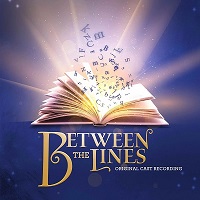 Original Off-Broadway Cast, 2022 (Ghostlight)
Original Off-Broadway Cast, 2022 (Ghostlight)  (3 / 5) Are you ever too old to fall in love with a fairytale? Or a fairytale prince? This question is the basis for Between the Lines, a musical by Elyssa Samsel and Kate Anderson that premiered Offf-Broadway in 2022. The show centers on troubled teen Delilah McPhee, who has to navigate life as a target of school bullies and the daughter of a divorced, broke, single mother. In order to survive her situation, Delilah has to find a way out, and she does that by falling in love with the prince from a fairytale book she has recently begun to read, the only copy of which happens to be in her school library. As the location of the show switches back and forth between reality and the fantasy world of the book, it’s easy for the cast album listener to get lost, all the more so because no interstitial dialogue is recorded here. For example, does Will Burton’s charming soft-shoe “Out of Character” come off as well if you don’t realize until the end of the song that he’s playing a dog? Or will you understand that, when Vicki Lewis performs “Can’t Get ‘Em Out,” she is playing the book’s author rather than a therapist or one of the few other characters she portrays in the show? As for the score itself, the main problem it that it suffers from a lack of originality. Since there are comparatively few teenage musicals, it’s impossible not to draw comparisons between this show’s high school outcast anthem “Allie McAndrews” and “I’d Rather Be Me” from Mean Girls, or between “Leaps and Bounds,” the nostalgic ballad heartbreakingly performed here by Julia Murney as Delilah’s mother, and, say, “Stop, Time” from Big. None of this is meant to suggest that Between the Lines is without its merits, the greatest ones being the catchiness of the tunes, whether melancholy or up-tempo, and the charming vocal performance by Jake David Smith as the handsome prince. Arielle Jacobs’ portrayal of Delilah is also compelling, and if some of the challenging score lies a bit outside of her vocal range, she has the acting chops to make up for it. Because of the many nice opportunities this show affords its cast in addition to the relatable story, it almost cries out for regional productions, and one can easily imagine that some of the score’s solo ballads will become audition room standards. So, ultimately, Between the Lines is worth your time, even if it’s a story you may feel you have read before. –– Charles Kirsch
(3 / 5) Are you ever too old to fall in love with a fairytale? Or a fairytale prince? This question is the basis for Between the Lines, a musical by Elyssa Samsel and Kate Anderson that premiered Offf-Broadway in 2022. The show centers on troubled teen Delilah McPhee, who has to navigate life as a target of school bullies and the daughter of a divorced, broke, single mother. In order to survive her situation, Delilah has to find a way out, and she does that by falling in love with the prince from a fairytale book she has recently begun to read, the only copy of which happens to be in her school library. As the location of the show switches back and forth between reality and the fantasy world of the book, it’s easy for the cast album listener to get lost, all the more so because no interstitial dialogue is recorded here. For example, does Will Burton’s charming soft-shoe “Out of Character” come off as well if you don’t realize until the end of the song that he’s playing a dog? Or will you understand that, when Vicki Lewis performs “Can’t Get ‘Em Out,” she is playing the book’s author rather than a therapist or one of the few other characters she portrays in the show? As for the score itself, the main problem it that it suffers from a lack of originality. Since there are comparatively few teenage musicals, it’s impossible not to draw comparisons between this show’s high school outcast anthem “Allie McAndrews” and “I’d Rather Be Me” from Mean Girls, or between “Leaps and Bounds,” the nostalgic ballad heartbreakingly performed here by Julia Murney as Delilah’s mother, and, say, “Stop, Time” from Big. None of this is meant to suggest that Between the Lines is without its merits, the greatest ones being the catchiness of the tunes, whether melancholy or up-tempo, and the charming vocal performance by Jake David Smith as the handsome prince. Arielle Jacobs’ portrayal of Delilah is also compelling, and if some of the challenging score lies a bit outside of her vocal range, she has the acting chops to make up for it. Because of the many nice opportunities this show affords its cast in addition to the relatable story, it almost cries out for regional productions, and one can easily imagine that some of the score’s solo ballads will become audition room standards. So, ultimately, Between the Lines is worth your time, even if it’s a story you may feel you have read before. –– Charles Kirsch
Category Archives: Reviews by Show Name
Busker Alley
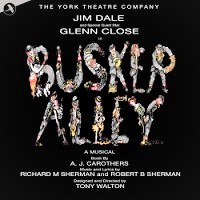 Studio Cast, 2007 (JAY)
Studio Cast, 2007 (JAY)  (1 / 5) Busker Alley never made it to Broadway, but it sure came close, first with a Tommy Tune-led national tour in 1995 (felled by Tune’s broken foot) and then with the York Theatre Company’s 2006 benefit concert starring Jim Dale (intended for a Broadway transfer that never happened). It’s the latter iteration that’s captured on this recording, including the one-night-only luxury casting of Glenn Close as the grown-up version of Libby, a pickpocket-turned-London busker-turned film star who abandons her lover and fellow street performer Charlie Baxter (Dale) in exchange for fame and fortune. Close introduces Charlie’s story in a spoken prologue and then returns at the end to sing, quite beautifully, “He Had A Way,” the gentle highlight of the album. Given the subject matter, many of the songs by the Sherman brothers (Mary Poppins, Over Here, etc.) are cloying street numbers, diegetic to the buskers’ world. The cast approaches these tunes with aggressive Cockney accents married to unnecessarily grating vocals meant to demonstrate, apparently, that these are resilient paupers down on their luck. Dale is fine, if ill-served by thin material, and he’s in his prime when farthest removed from the abiding, overzealous performance style, as in an angry reprise of the ballad “How Long Have I Loved Libby?” and in the short, sweet “Charlie the Busker.” As the younger Libby, Jessica Grové offers an endearing “He Has A Way,” but her Eliza Doolittle drawl is unsubtly distracting. Brevity here is not necessarily the soul of either wit or rich character development, and many of the songs are so brisk that it’s hard to glean much of a dramatic through-line. The street numbers also quickly become indistinguishable from one another (only the lively “Paddle Your Own Canoe” stands out), not helped by the repetitive arrangements for piano and drums. For the completist, it’s nice to have this score recorded, but this album doesn’t make a convincing case that the disappearance of Busker Alley was any great loss. — Dan Rubins
(1 / 5) Busker Alley never made it to Broadway, but it sure came close, first with a Tommy Tune-led national tour in 1995 (felled by Tune’s broken foot) and then with the York Theatre Company’s 2006 benefit concert starring Jim Dale (intended for a Broadway transfer that never happened). It’s the latter iteration that’s captured on this recording, including the one-night-only luxury casting of Glenn Close as the grown-up version of Libby, a pickpocket-turned-London busker-turned film star who abandons her lover and fellow street performer Charlie Baxter (Dale) in exchange for fame and fortune. Close introduces Charlie’s story in a spoken prologue and then returns at the end to sing, quite beautifully, “He Had A Way,” the gentle highlight of the album. Given the subject matter, many of the songs by the Sherman brothers (Mary Poppins, Over Here, etc.) are cloying street numbers, diegetic to the buskers’ world. The cast approaches these tunes with aggressive Cockney accents married to unnecessarily grating vocals meant to demonstrate, apparently, that these are resilient paupers down on their luck. Dale is fine, if ill-served by thin material, and he’s in his prime when farthest removed from the abiding, overzealous performance style, as in an angry reprise of the ballad “How Long Have I Loved Libby?” and in the short, sweet “Charlie the Busker.” As the younger Libby, Jessica Grové offers an endearing “He Has A Way,” but her Eliza Doolittle drawl is unsubtly distracting. Brevity here is not necessarily the soul of either wit or rich character development, and many of the songs are so brisk that it’s hard to glean much of a dramatic through-line. The street numbers also quickly become indistinguishable from one another (only the lively “Paddle Your Own Canoe” stands out), not helped by the repetitive arrangements for piano and drums. For the completist, it’s nice to have this score recorded, but this album doesn’t make a convincing case that the disappearance of Busker Alley was any great loss. — Dan Rubins
Flying Over Sunset
 Original Broadway Cast, 2022 (Masterworks Broadway)
Original Broadway Cast, 2022 (Masterworks Broadway)  (2 / 5) One thing that can be said for Flying Over Sunset is that it’s certainly ambitious. Conceived and directed by James Lapine, the musical tells of a fictional meeting between movie star Cary Grant (Tony Yazbeck), novelist/philosopher Aldous Huxley (Henry Hadden-Paton), and playwright/politician Clare Boothe Luce (Carmen Cusack), during which the three experiment with the psychological benefits and detriments of LSD — something all three did in real life, but separately. In an effort to theatricalize the effects of the drug and its ability to remove its revelers from reality, all of the songs in this show occur during the characters’ hallucinations. While this allows composer Tom Kitt to create lush compositions, elegantly orchestrated by Michael Starobin, the score only succeeds intermittently. As was the case with her turn in Bright Star, Cusack is once again here given the best material, and she elevates it with her vocal luster and nuanced acting. The ultimate highlight of the recording is the title number, sung during Luce’s first LSD trip as she hallucinates and harmonizes with her deceased mother and daughter. Other elements of the score, however, are just odd. Songs like “Rocket Ship” and “Three Englishmen,” though well performed by Yazbeck, Hadden-Paton, and Robert Sella (as the group’s LSD guru), may prompt one to question whether some of the content of this show is intended to be camp. Listening to Flying Over Sunset, musical theater fans will learn, along with the show’s trio, that for every beautiful high there’s usually a disorienting low. — Matt Koplik
(2 / 5) One thing that can be said for Flying Over Sunset is that it’s certainly ambitious. Conceived and directed by James Lapine, the musical tells of a fictional meeting between movie star Cary Grant (Tony Yazbeck), novelist/philosopher Aldous Huxley (Henry Hadden-Paton), and playwright/politician Clare Boothe Luce (Carmen Cusack), during which the three experiment with the psychological benefits and detriments of LSD — something all three did in real life, but separately. In an effort to theatricalize the effects of the drug and its ability to remove its revelers from reality, all of the songs in this show occur during the characters’ hallucinations. While this allows composer Tom Kitt to create lush compositions, elegantly orchestrated by Michael Starobin, the score only succeeds intermittently. As was the case with her turn in Bright Star, Cusack is once again here given the best material, and she elevates it with her vocal luster and nuanced acting. The ultimate highlight of the recording is the title number, sung during Luce’s first LSD trip as she hallucinates and harmonizes with her deceased mother and daughter. Other elements of the score, however, are just odd. Songs like “Rocket Ship” and “Three Englishmen,” though well performed by Yazbeck, Hadden-Paton, and Robert Sella (as the group’s LSD guru), may prompt one to question whether some of the content of this show is intended to be camp. Listening to Flying Over Sunset, musical theater fans will learn, along with the show’s trio, that for every beautiful high there’s usually a disorienting low. — Matt Koplik
All in Love
 Original Off-Broadway Cast, 1961 (Mercury/Stage Door)
Original Off-Broadway Cast, 1961 (Mercury/Stage Door)  (2 / 5) With its lithe but insubstantial score, preserved nearly complete on the cast album, All In Love turned Richard Brinsley Sheridan’s classic farce The Rivals into a jaunty musical comedy. Featuring music by Jacques Urbont and lyrics by Bruce Geller, the show ran Off-Broadway briefly in 1961, though the album cover misleadingly declares that it was a “Broadway Hit Show.” The plot: Wealthy Captain Jack Absolute (David Atkinson) must disguise himself in pursuing Lydia Languish (Gaylea Byrne) because she desperately wants to marry a poor man. (“He can’t be all bad if he’s good and poor,” she sings in the opening number.) Urbont’s melodies are solidly good-natured but unmemorable throughout; the best of them include Atkinson’s ballad “I Love A Fool” (in which Jack praises Lydia’s “refined imbecility”) and the chipper “I Found Him,” sung by Christina Gillespie as the enamored servant Lucy. The composer ventures towards harmonic ambition only in “Why Wives?,” a vocally intricate but thematically dubious ensemble piece in which the men air their frustrations with monogamy. Geller’s lyrics could be wittier, but his love songs aren’t bad. For example, at one point Lucy exclaims: “I want everyone to know/That, just a miracle ago, I found him.” Lee Cass stands out among the singers, showing off his exquisite bass timbre in “The Lady Was Made To Be Loved.” The Rivals is now probably best known for introducing the character Mrs. Malaprop, Lydia’s twisty-tongued aunt; Mimi Randolph in that role delivers an appropriately silly number, “A More Than Ordinary Glorious Vocabulary,” in which she drops such jumbled wisdom as “Men are never contraceptive to a well-turned phrase.” All in Love is notable for the involvement of actor Dom DeLuise, who appeared in this show three years before his film debut, and orchestrator Jonathan Tunick. DeLuise’s only major moment on the album comes when he leads “Odds,” a goofy, disposable novelty number about cursing. But Tunick’s work glows throughout, emulating the best of his Golden Age forebears in using a large orchestral palette while en route to his game-changing collaborations with Burt Bacharach and Stephen Sondheim — Dan Rubins
(2 / 5) With its lithe but insubstantial score, preserved nearly complete on the cast album, All In Love turned Richard Brinsley Sheridan’s classic farce The Rivals into a jaunty musical comedy. Featuring music by Jacques Urbont and lyrics by Bruce Geller, the show ran Off-Broadway briefly in 1961, though the album cover misleadingly declares that it was a “Broadway Hit Show.” The plot: Wealthy Captain Jack Absolute (David Atkinson) must disguise himself in pursuing Lydia Languish (Gaylea Byrne) because she desperately wants to marry a poor man. (“He can’t be all bad if he’s good and poor,” she sings in the opening number.) Urbont’s melodies are solidly good-natured but unmemorable throughout; the best of them include Atkinson’s ballad “I Love A Fool” (in which Jack praises Lydia’s “refined imbecility”) and the chipper “I Found Him,” sung by Christina Gillespie as the enamored servant Lucy. The composer ventures towards harmonic ambition only in “Why Wives?,” a vocally intricate but thematically dubious ensemble piece in which the men air their frustrations with monogamy. Geller’s lyrics could be wittier, but his love songs aren’t bad. For example, at one point Lucy exclaims: “I want everyone to know/That, just a miracle ago, I found him.” Lee Cass stands out among the singers, showing off his exquisite bass timbre in “The Lady Was Made To Be Loved.” The Rivals is now probably best known for introducing the character Mrs. Malaprop, Lydia’s twisty-tongued aunt; Mimi Randolph in that role delivers an appropriately silly number, “A More Than Ordinary Glorious Vocabulary,” in which she drops such jumbled wisdom as “Men are never contraceptive to a well-turned phrase.” All in Love is notable for the involvement of actor Dom DeLuise, who appeared in this show three years before his film debut, and orchestrator Jonathan Tunick. DeLuise’s only major moment on the album comes when he leads “Odds,” a goofy, disposable novelty number about cursing. But Tunick’s work glows throughout, emulating the best of his Golden Age forebears in using a large orchestral palette while en route to his game-changing collaborations with Burt Bacharach and Stephen Sondheim — Dan Rubins
A Beautiful Noise
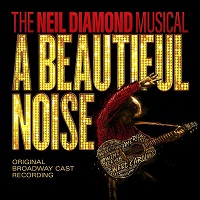 Original Broadway Cast, 2023 (UMe)
Original Broadway Cast, 2023 (UMe)  (3 / 5) This recording differs from the cast albums of many other jukebox musicals, including biomusicals such as Jersey Boys and Beautiful, in that the arrangements and orchestrations here are not close copies of those heard in these songs as originally written and recorded — in this case by Neil Diamond, the subject of this show. A Beautiful Noise exhibits more creativity in that regard, with fresh arrangements (by Sonny Paladino) and orchestrations (by Brian Usifer, Bob Gaudio, and Paladino) that recall the originals just closely enough to keep Diamond fans happy without sounding like carbon copies of the old charts. There’s also a delightful “Opening Montage” featuring snippets of a large handful of Diamond hits in piquant choral arrangements for the ensemble. Another plus for the album is the stellar work of Will Swenson, who somehow manages to very credibly channel Neil Diamond’s husky rock baritone in such hits as “Sweet Caroline,” “Cracklin’ Rosie,” “Love on The Rocks,” etc., etc., even though the natural timbre of Swenson’s singing voice as heard in other shows and on other recordings is considerably lighter and higher. A persuasive argument for experiencing this show through the cast album, rather than actually attending a performance on Broadway, is that the audio-only option means you don’t have to suffer through the sometimes ridiculous setups for these pop songs as they have been placed within the book that Anthony McCarten has written around them — none more egregious than the setup for “You Don’t Bring Me Flowers,” here presented as a bittersweet farewell sung by Neil and his second wife, Marcia Murphey (Robyn Hurder), even though the lyrics have nothing to do with the issues that actually broke up their marriage. Recorded with no dialogue introduction whatsoever, this song may be thoroughly enjoyed out of context, along with all the rest on the album. — Michael Portantiere
(3 / 5) This recording differs from the cast albums of many other jukebox musicals, including biomusicals such as Jersey Boys and Beautiful, in that the arrangements and orchestrations here are not close copies of those heard in these songs as originally written and recorded — in this case by Neil Diamond, the subject of this show. A Beautiful Noise exhibits more creativity in that regard, with fresh arrangements (by Sonny Paladino) and orchestrations (by Brian Usifer, Bob Gaudio, and Paladino) that recall the originals just closely enough to keep Diamond fans happy without sounding like carbon copies of the old charts. There’s also a delightful “Opening Montage” featuring snippets of a large handful of Diamond hits in piquant choral arrangements for the ensemble. Another plus for the album is the stellar work of Will Swenson, who somehow manages to very credibly channel Neil Diamond’s husky rock baritone in such hits as “Sweet Caroline,” “Cracklin’ Rosie,” “Love on The Rocks,” etc., etc., even though the natural timbre of Swenson’s singing voice as heard in other shows and on other recordings is considerably lighter and higher. A persuasive argument for experiencing this show through the cast album, rather than actually attending a performance on Broadway, is that the audio-only option means you don’t have to suffer through the sometimes ridiculous setups for these pop songs as they have been placed within the book that Anthony McCarten has written around them — none more egregious than the setup for “You Don’t Bring Me Flowers,” here presented as a bittersweet farewell sung by Neil and his second wife, Marcia Murphey (Robyn Hurder), even though the lyrics have nothing to do with the issues that actually broke up their marriage. Recorded with no dialogue introduction whatsoever, this song may be thoroughly enjoyed out of context, along with all the rest on the album. — Michael Portantiere
Anyone Can Whistle
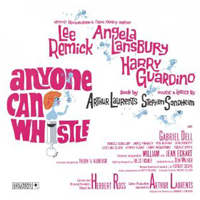 Original Broadway Cast, 1964 (Columbia/Sony)
Original Broadway Cast, 1964 (Columbia/Sony)  (5 / 5) The show was a flop, but virtually every number is a winner, and so is this recording. Broadway audiences were bored by Arthur Laurents’ bizarre, satirical fable in which corrupt, small-town politicians fake a miracle by pumping water out of a rock, thus creating a new Lourdes with its attendant tourist trade. But what a cast! Angela Lansbury launched her musical theater career as Cora Hoover Hooper, the scheming mayor. Her co-stars were Lee Remick as Fay Apple, head nurse in the local nuthouse (named The Cookie Jar!), and Harry Guardino as J. Bowden Hapgood, a phony psychiatrist who stirs up trouble. And what a score! Stephen Sondheim’s wildly inventive songs include a lengthy musical-dramatic sequence, “Simple,” and a campy ballet, “The Cookie Chase.” Lansbury’s opener, “Me and My Town,” is a riotous spoof of nightclub-diva dramatics. Remick gets the achingly beautiful title tune, and Guardino delivers the biting, driving “Everybody Says Don’t.” The final duet for Hapgood and Fay, “With So Little to Be Sure Of,” is one of Sondheim’s finest, most adult love songs. Don Walker’s orchestrations are brassy and delightful. Recorded the day after the show closed, the album has a raw quality — Lansbury, for one, evidences some vocal strain — that, paradoxically, makes it seem fresher than many recordings that are more polished. One of Remick’s numbers, “There Won’t Be Trumpets,” was cut before the show opened and left off the LP, but has been restored for the CD. This kind of “failure” is far more interesting than lots of long-running hits. Note: Look for the version of the cast album marked “Deluxe Expanded Edition.” It includes bonus tracks of Sondheim singing demo versions of, among other things, the cut number “The Lame, the Halt, and the Blind” and an alternate version of “With So Little to Be Sure Of.” — David Barbour
(5 / 5) The show was a flop, but virtually every number is a winner, and so is this recording. Broadway audiences were bored by Arthur Laurents’ bizarre, satirical fable in which corrupt, small-town politicians fake a miracle by pumping water out of a rock, thus creating a new Lourdes with its attendant tourist trade. But what a cast! Angela Lansbury launched her musical theater career as Cora Hoover Hooper, the scheming mayor. Her co-stars were Lee Remick as Fay Apple, head nurse in the local nuthouse (named The Cookie Jar!), and Harry Guardino as J. Bowden Hapgood, a phony psychiatrist who stirs up trouble. And what a score! Stephen Sondheim’s wildly inventive songs include a lengthy musical-dramatic sequence, “Simple,” and a campy ballet, “The Cookie Chase.” Lansbury’s opener, “Me and My Town,” is a riotous spoof of nightclub-diva dramatics. Remick gets the achingly beautiful title tune, and Guardino delivers the biting, driving “Everybody Says Don’t.” The final duet for Hapgood and Fay, “With So Little to Be Sure Of,” is one of Sondheim’s finest, most adult love songs. Don Walker’s orchestrations are brassy and delightful. Recorded the day after the show closed, the album has a raw quality — Lansbury, for one, evidences some vocal strain — that, paradoxically, makes it seem fresher than many recordings that are more polished. One of Remick’s numbers, “There Won’t Be Trumpets,” was cut before the show opened and left off the LP, but has been restored for the CD. This kind of “failure” is far more interesting than lots of long-running hits. Note: Look for the version of the cast album marked “Deluxe Expanded Edition.” It includes bonus tracks of Sondheim singing demo versions of, among other things, the cut number “The Lame, the Halt, and the Blind” and an alternate version of “With So Little to Be Sure Of.” — David Barbour
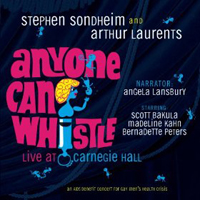 Carnegie Hall Concert Cast, 1995 (Columbia/Sony)
Carnegie Hall Concert Cast, 1995 (Columbia/Sony)  (1 / 5) This live recording of a starry concert version of Anyone Can Whistle, produced as a benefit for Gay Men’s Health Crisis, preserves more of the score than is heard on the original cast album. It includes “There Won’t Be Trumpets” as well as “There’s Always a Woman,” an unpleasant bitch-fest between Cora and Fay that was also cut from the score before the show opened on Broadway. But, 30 years on, nobody can muster much conviction for Laurents’ talky satire. As Cora, Fay, and Hapgood, Madeline Kahn, Bernadette Peters, and Scott Bakula respectively offer tentative, vocally wobbly performances, while Angela Lansbury narrates. Peters manages a lovely version of the title tune but lacks Remick’s vulnerability, and she’s really at a loss in the scenes where Fay impersonates a sexy French temptress. Kahn is the biggest disappointment here, giving a performance that lacks bite or energy. And Bakula doesn’t possess Guardino’s rough authority. What’s especially missed is the urgency of the original album. As sometimes happens in live recordings, the balance between singers and the orchestra is not ideal. Even Don Walker’s orchestrations, supervised by Jonathan Tunick, lose some edge. — D.B.
(1 / 5) This live recording of a starry concert version of Anyone Can Whistle, produced as a benefit for Gay Men’s Health Crisis, preserves more of the score than is heard on the original cast album. It includes “There Won’t Be Trumpets” as well as “There’s Always a Woman,” an unpleasant bitch-fest between Cora and Fay that was also cut from the score before the show opened on Broadway. But, 30 years on, nobody can muster much conviction for Laurents’ talky satire. As Cora, Fay, and Hapgood, Madeline Kahn, Bernadette Peters, and Scott Bakula respectively offer tentative, vocally wobbly performances, while Angela Lansbury narrates. Peters manages a lovely version of the title tune but lacks Remick’s vulnerability, and she’s really at a loss in the scenes where Fay impersonates a sexy French temptress. Kahn is the biggest disappointment here, giving a performance that lacks bite or energy. And Bakula doesn’t possess Guardino’s rough authority. What’s especially missed is the urgency of the original album. As sometimes happens in live recordings, the balance between singers and the orchestra is not ideal. Even Don Walker’s orchestrations, supervised by Jonathan Tunick, lose some edge. — D.B.
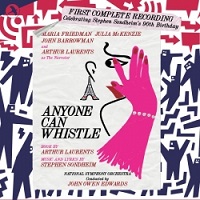 Studio Cast, 1997/2020 (JAY, 2CDs)
Studio Cast, 1997/2020 (JAY, 2CDs)  (2 / 5) Elephants, who take 23 months to gestate, have nothing on this two-disc set, which incubated for 23 years. Recording began, and the bulk of it was completed, in 1997 — several presidential administrations ago. This is one of those JAY efforts billed as complete recordings, including playoffs and curtain call and exit music. Chat room savants insist that certain numbers have been cut slightly, and “There’s Always a Woman” is M.I.A. Nevertheless, this is the fullest recorded edition of Anyone Can Whistle that we are likely to get. Happily preserved are “The Cookie Chase” (in a lengthier version than that contained on the OBCR) and the ballet attached to “Everybody Says Don’t,” one of the jazzier passages in any Sondheim-composed musical. But the overly reverent approach to this score, treating a scrappy, satirical musical like a tony Gesamtkunstwerk, is counterproductive. Of the three stars, Julia McKenzie comes off best, punching her way through “Me and My Town” and “A Parade in Town” with gusto, but, unlike Lansbury, she doesn’t seem to be having fun with Cora’s cartoon-villain qualities. John Barrowman is a disconcertingly boyish Hapgood, which may be why he oversells “Everybody Says Don’t,” shouting every fifth or sixth word of the lyrics to signal his passion. Also problematic is Maria Friedman as Fay — a joyless Joan of Arc, lacking in warmth and applying an unpleasant vibrato to several numbers. Everyone’s line readings are pretty dire; this is a real issue in “Simple,” which weaves together music and dialogue. Conductor John Owen Edwards gets an expansive sound out of the National Symphony Orchestra, not always an asset in a show designed to be a sprightly spoof. It’s a pity that nobody recorded the 2010 New York City Center Encores! production of Anyone Can Whistle, which boasted the nearly ideal cast of Raúl Esparza, Sutton Foster, and Donna Murphy. But if you’re a superfan of the show, you’ll want to hear this recording if only because it does have material not available anywhere else — with Arthur Laurents, sounding like he needs a nap, providing occasional narration — D.B.
(2 / 5) Elephants, who take 23 months to gestate, have nothing on this two-disc set, which incubated for 23 years. Recording began, and the bulk of it was completed, in 1997 — several presidential administrations ago. This is one of those JAY efforts billed as complete recordings, including playoffs and curtain call and exit music. Chat room savants insist that certain numbers have been cut slightly, and “There’s Always a Woman” is M.I.A. Nevertheless, this is the fullest recorded edition of Anyone Can Whistle that we are likely to get. Happily preserved are “The Cookie Chase” (in a lengthier version than that contained on the OBCR) and the ballet attached to “Everybody Says Don’t,” one of the jazzier passages in any Sondheim-composed musical. But the overly reverent approach to this score, treating a scrappy, satirical musical like a tony Gesamtkunstwerk, is counterproductive. Of the three stars, Julia McKenzie comes off best, punching her way through “Me and My Town” and “A Parade in Town” with gusto, but, unlike Lansbury, she doesn’t seem to be having fun with Cora’s cartoon-villain qualities. John Barrowman is a disconcertingly boyish Hapgood, which may be why he oversells “Everybody Says Don’t,” shouting every fifth or sixth word of the lyrics to signal his passion. Also problematic is Maria Friedman as Fay — a joyless Joan of Arc, lacking in warmth and applying an unpleasant vibrato to several numbers. Everyone’s line readings are pretty dire; this is a real issue in “Simple,” which weaves together music and dialogue. Conductor John Owen Edwards gets an expansive sound out of the National Symphony Orchestra, not always an asset in a show designed to be a sprightly spoof. It’s a pity that nobody recorded the 2010 New York City Center Encores! production of Anyone Can Whistle, which boasted the nearly ideal cast of Raúl Esparza, Sutton Foster, and Donna Murphy. But if you’re a superfan of the show, you’ll want to hear this recording if only because it does have material not available anywhere else — with Arthur Laurents, sounding like he needs a nap, providing occasional narration — D.B.
Carrie
 Premiere Cast Recording, 2012 (Ghostlight)
Premiere Cast Recording, 2012 (Ghostlight)  (2 / 5) Based on the supernatural horror novel by Stephen King, which had previously been adapted as a highly successful film in 1976, Carrie is/was one of the most infamous, ignominious flops in musical theater history. After a disastrous tryout run in Stratford-Upon Avon, the show managed only 16 previews and five performances on Broadway in the spring of 1988, yielding no cast album. Many critics and others felt that the work of composer Michael Gore, lyricist Dean Pitchford, and book writer Lawrence D. Cohen was wildly inconsistent in quality, with several riveting moments of confrontation between the bullied, telekinetic teenager Carrie White and her religious zealot mother Margaret playing out powerfully in the midst of risible scenes and songs concerning Carrie’s experiences in high school. Apparently, much of the problem with the production rested in the fact that the American creative team and director Terry Hands of the Royal Shakespeare Company were not on the same page as to what the look, tone, and presentation style of the show should be. But, as noted, there were also huge problems in the writing, leading to major changes for the revisal that was presented Off-Broadway in 2012. The songs “Dream On,” “It Hurts to Be Strong,” “Don’t Waste the Moon,” “Heaven,” “I’m Not Alone,” “Wotta Night,” and the camp classic “Out for Blood” were all dropped, while several new ones were added; two of the best of them are the ballad “Dreamer in Disguise,” sweetly sung by Derek Klena in the role of Tommy Ross, and “Stay Here Instead,” in which Margaret pathetically pleads with her daughter not to go to the prom. (If only she had listened!) But there are still a few mediocre or worse numbers among both the old and new songs, for example, “In” and “A Night We’ll Never Forget.” As was the case with the original version, the score’s musical/dramatic highlights are the unnerving Carrie/Margaret duets “And Eve Was Weak” and “I Remember How Those Boys Could Dance,” and Margaret’s moving solo “When There’s No One.” On the cast album of the 2012 production, these and other songs benefit greatly from the deeply committed performances of Molly Ranson as the tormented Carrie and one of the all-time Broadway greats, Marin Mazzie, as her sadly deranged mother. Rounding out the strong cast are Christy Altomare as Sue, Jeanna de Waal as Chris, Ben Thompson as Billy, Wayne Alan Wilcox as Mr. Stephens, and Carmen Cusack in a wonderfully warm turn as Miss Gardner. — Michael Portantiere
(2 / 5) Based on the supernatural horror novel by Stephen King, which had previously been adapted as a highly successful film in 1976, Carrie is/was one of the most infamous, ignominious flops in musical theater history. After a disastrous tryout run in Stratford-Upon Avon, the show managed only 16 previews and five performances on Broadway in the spring of 1988, yielding no cast album. Many critics and others felt that the work of composer Michael Gore, lyricist Dean Pitchford, and book writer Lawrence D. Cohen was wildly inconsistent in quality, with several riveting moments of confrontation between the bullied, telekinetic teenager Carrie White and her religious zealot mother Margaret playing out powerfully in the midst of risible scenes and songs concerning Carrie’s experiences in high school. Apparently, much of the problem with the production rested in the fact that the American creative team and director Terry Hands of the Royal Shakespeare Company were not on the same page as to what the look, tone, and presentation style of the show should be. But, as noted, there were also huge problems in the writing, leading to major changes for the revisal that was presented Off-Broadway in 2012. The songs “Dream On,” “It Hurts to Be Strong,” “Don’t Waste the Moon,” “Heaven,” “I’m Not Alone,” “Wotta Night,” and the camp classic “Out for Blood” were all dropped, while several new ones were added; two of the best of them are the ballad “Dreamer in Disguise,” sweetly sung by Derek Klena in the role of Tommy Ross, and “Stay Here Instead,” in which Margaret pathetically pleads with her daughter not to go to the prom. (If only she had listened!) But there are still a few mediocre or worse numbers among both the old and new songs, for example, “In” and “A Night We’ll Never Forget.” As was the case with the original version, the score’s musical/dramatic highlights are the unnerving Carrie/Margaret duets “And Eve Was Weak” and “I Remember How Those Boys Could Dance,” and Margaret’s moving solo “When There’s No One.” On the cast album of the 2012 production, these and other songs benefit greatly from the deeply committed performances of Molly Ranson as the tormented Carrie and one of the all-time Broadway greats, Marin Mazzie, as her sadly deranged mother. Rounding out the strong cast are Christy Altomare as Sue, Jeanna de Waal as Chris, Ben Thompson as Billy, Wayne Alan Wilcox as Mr. Stephens, and Carmen Cusack in a wonderfully warm turn as Miss Gardner. — Michael Portantiere
Emojiland
 Original Off-Broadway Cast, 2020 (Broadway Records)
Original Off-Broadway Cast, 2020 (Broadway Records)  (2 / 5) This recording represents the Off-Broadway production of Emojiland, a knowingly campy musical that proudly planted its digital freak flag on the theatrical landscape. In an era when even many Off-Broadway ventures are crafted for mainstream appeal, usually in the hope of receiving a transfer to Broadway, it’s somewhat refreshing to listen to this cast album of a show that has no objective other than to entertain through humor and absurdity. How successful it is at doing so is another matter. Written by Laura Schein and Keith Harrison, the musical takes its title from the ideograms that have become so popular in the age of communication through digital devices. The story explores a world populated by these emojis — including such favorites as Kissy Face and Pile of Poo — as they grapple with the disruption of their society that has resulted from the latest software update. Though the show’s plot touches on major themes like xenophobia and prejudice, Emojiland has no intention of being any meatier than a bag of gummy bears. Schein and Harrison’s upbeat score appropriately leans towards techno-pop, and if their lyrics aren’t laugh-out-loud funny, they’re contentedly witty and keep the fun going. Emojiland also benefits from a cast that appears game for the ridiculousness of the piece, led by Schein herself as ingénue Smize. Lesli Margherita and Josh Lamon, in particular, give ingenious comedic turns as the emojis Princeess and Prince, respectively. Like any sugar rush, the show starts to wear itself out rather quickly, and once Lamon and Margherita finish letting loose with the Act 2 opener “Firewall Ball,” the album becomes something of a chore to finish. But even if it doesn’t stay with you for long, Emojiland offers lots of fun in the moment. — Matt Koplik
(2 / 5) This recording represents the Off-Broadway production of Emojiland, a knowingly campy musical that proudly planted its digital freak flag on the theatrical landscape. In an era when even many Off-Broadway ventures are crafted for mainstream appeal, usually in the hope of receiving a transfer to Broadway, it’s somewhat refreshing to listen to this cast album of a show that has no objective other than to entertain through humor and absurdity. How successful it is at doing so is another matter. Written by Laura Schein and Keith Harrison, the musical takes its title from the ideograms that have become so popular in the age of communication through digital devices. The story explores a world populated by these emojis — including such favorites as Kissy Face and Pile of Poo — as they grapple with the disruption of their society that has resulted from the latest software update. Though the show’s plot touches on major themes like xenophobia and prejudice, Emojiland has no intention of being any meatier than a bag of gummy bears. Schein and Harrison’s upbeat score appropriately leans towards techno-pop, and if their lyrics aren’t laugh-out-loud funny, they’re contentedly witty and keep the fun going. Emojiland also benefits from a cast that appears game for the ridiculousness of the piece, led by Schein herself as ingénue Smize. Lesli Margherita and Josh Lamon, in particular, give ingenious comedic turns as the emojis Princeess and Prince, respectively. Like any sugar rush, the show starts to wear itself out rather quickly, and once Lamon and Margherita finish letting loose with the Act 2 opener “Firewall Ball,” the album becomes something of a chore to finish. But even if it doesn’t stay with you for long, Emojiland offers lots of fun in the moment. — Matt Koplik
Broadway Bounty Hunter
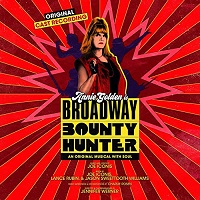 Original Off-Broadway Cast, 2020 (Ghostlight)
Original Off-Broadway Cast, 2020 (Ghostlight)  (4 / 5) Here’s a highly enjoyable cast album of a fun show with a fanciful, meta-theatrical concept, built around the dynamic singer-actress Annie Golden, who started out as the leader of the punk band The Shirts before going on to play Jeannie in the film version of Hair, then to numerous other film, TV, and stage roles. In Broadway Bounty Hunter, Golden played a highly fictionalized version of herself caught up in a crazy plot involving — well, bounty hunting. The show was (obviously) crafted specifically for her by the super-talented composer-lyricist Joe Iconis, working in collaboration with co-book writers Lance Rubin and Jason Sweettooth Williams. It would have been interesting to see if Broadway Bounty Hunter would have worked with someone else in the title role in subsequent productions, but it was not a box-office success in its limited Off-Broadway run, and there was no transfer to an open-ended engagement on Broadway or anywhere else. So it’s nice to have Iconis’s clever, tuneful, post-modern theatrical rock and pop songs preserved on this well produced cast album. Golden’s strong, exciting voice and her abundance of charisma come through big-time in a clutch of songs, from the roof-raising “Woman of a Certain Age” (wisely used as both the show’s opener and closer) to the soulful “Spin Those Records” and the intense, hard-rocking 11 o’clock number “Veins.” Other major voices and personalities heard on the album include Badia Farha, Alan H. Green, Christina Sajous, Emily Borromeo, and the always welcome Brad Oscar. A kick-ass band is led by conductor/musical director Geoffrey Ko, and Joel Waggoner’s vocal arrangements are excellent. Given the lack of commercial success of both Broadway Bounty Hunter and Iconis’s Be More Chill, at least in their NYC runs, it’s devoutly to be wished that he’ll soon have the major hit he deserves. — Michael Portantiere
(4 / 5) Here’s a highly enjoyable cast album of a fun show with a fanciful, meta-theatrical concept, built around the dynamic singer-actress Annie Golden, who started out as the leader of the punk band The Shirts before going on to play Jeannie in the film version of Hair, then to numerous other film, TV, and stage roles. In Broadway Bounty Hunter, Golden played a highly fictionalized version of herself caught up in a crazy plot involving — well, bounty hunting. The show was (obviously) crafted specifically for her by the super-talented composer-lyricist Joe Iconis, working in collaboration with co-book writers Lance Rubin and Jason Sweettooth Williams. It would have been interesting to see if Broadway Bounty Hunter would have worked with someone else in the title role in subsequent productions, but it was not a box-office success in its limited Off-Broadway run, and there was no transfer to an open-ended engagement on Broadway or anywhere else. So it’s nice to have Iconis’s clever, tuneful, post-modern theatrical rock and pop songs preserved on this well produced cast album. Golden’s strong, exciting voice and her abundance of charisma come through big-time in a clutch of songs, from the roof-raising “Woman of a Certain Age” (wisely used as both the show’s opener and closer) to the soulful “Spin Those Records” and the intense, hard-rocking 11 o’clock number “Veins.” Other major voices and personalities heard on the album include Badia Farha, Alan H. Green, Christina Sajous, Emily Borromeo, and the always welcome Brad Oscar. A kick-ass band is led by conductor/musical director Geoffrey Ko, and Joel Waggoner’s vocal arrangements are excellent. Given the lack of commercial success of both Broadway Bounty Hunter and Iconis’s Be More Chill, at least in their NYC runs, it’s devoutly to be wished that he’ll soon have the major hit he deserves. — Michael Portantiere
Be More Chill
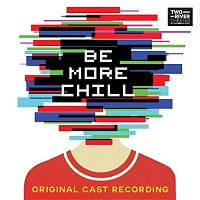 Original Cast, Two River Theater, 2015 (Ghostlight)
Original Cast, Two River Theater, 2015 (Ghostlight)  (4 / 5) Based on a novel by Ned Vizzini, Be More Chill is a cautionary tale about a loner teenager named Jeremy Heere who attempts to become “chill” by ingesting something called a “squip” (super quantum unit Intel processor), which winds up controlling his thoughts and actions. The show premiered at the Two River Theater in Red Bank, New Jersey for a one-month limited run in 2015. That production received mixed reviews, but this cast recording gained huge popularity via internet streaming and downloads, eventually sparking the Off-Broadway production of 2018 and the subsequent Broadway transfer (see below). Even if it’s hard to explain exactly how the score “went viral,” it’s easy to understand why it did: Composer-lyricist Joe Iconis has a firm grounding in the classic musical theater canon, and a great talent for being able to wed traditional song structures and other methods of craft with an up-to-the-minute sound and sensibility. Listen to the opener, “More Than Survive,” a spot-on, character-establishing, “I want” song for Jeremy that begins as follows: “C-c-c-come on, c-c-c- come on! Go, go! I’m waiting for my porn to download.” (The album has an “explicit lyrics” label.) Or sample “The Smartphone Hour (Rich Set a Fire),” a super-clever takeoff on “The Telephone Hour” from Bye Bye Birdie. Also quite amusing is Iconis’s depiction of present-day high school theater subculture, as in “I Love Play Rehearsal.” The pretty much ideal cast heard here is led by Will Connolly as a charmingly nerdy Jeremy, with Eric William Morris as The Squip; George Salazar as Jeremy’s staunch friend, Michael; Stephanie Hsu as Christine, the girl with whom Jeremy’s obsessed; and Gerard Canonico in a ball-of-fire performance as Rich, the ill-fated guy who turns Jeremy on to The Squip. Salazar does a tour-de-force job with arguably the best song in the score, the one that became the biggest viral phenomenon of all: “Michael in the Bathroom,” an affecting anthem of teen angst. — Michael Portantiere
(4 / 5) Based on a novel by Ned Vizzini, Be More Chill is a cautionary tale about a loner teenager named Jeremy Heere who attempts to become “chill” by ingesting something called a “squip” (super quantum unit Intel processor), which winds up controlling his thoughts and actions. The show premiered at the Two River Theater in Red Bank, New Jersey for a one-month limited run in 2015. That production received mixed reviews, but this cast recording gained huge popularity via internet streaming and downloads, eventually sparking the Off-Broadway production of 2018 and the subsequent Broadway transfer (see below). Even if it’s hard to explain exactly how the score “went viral,” it’s easy to understand why it did: Composer-lyricist Joe Iconis has a firm grounding in the classic musical theater canon, and a great talent for being able to wed traditional song structures and other methods of craft with an up-to-the-minute sound and sensibility. Listen to the opener, “More Than Survive,” a spot-on, character-establishing, “I want” song for Jeremy that begins as follows: “C-c-c-come on, c-c-c- come on! Go, go! I’m waiting for my porn to download.” (The album has an “explicit lyrics” label.) Or sample “The Smartphone Hour (Rich Set a Fire),” a super-clever takeoff on “The Telephone Hour” from Bye Bye Birdie. Also quite amusing is Iconis’s depiction of present-day high school theater subculture, as in “I Love Play Rehearsal.” The pretty much ideal cast heard here is led by Will Connolly as a charmingly nerdy Jeremy, with Eric William Morris as The Squip; George Salazar as Jeremy’s staunch friend, Michael; Stephanie Hsu as Christine, the girl with whom Jeremy’s obsessed; and Gerard Canonico in a ball-of-fire performance as Rich, the ill-fated guy who turns Jeremy on to The Squip. Salazar does a tour-de-force job with arguably the best song in the score, the one that became the biggest viral phenomenon of all: “Michael in the Bathroom,” an affecting anthem of teen angst. — Michael Portantiere
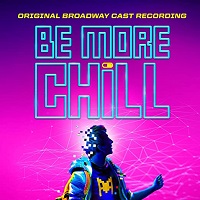 Original Broadway Cast, 2019 (Ghostlight, 2CDs)
Original Broadway Cast, 2019 (Ghostlight, 2CDs)  (4 / 5) Buoyed by the extraordinary online popularity of its score, as described above, Be More Chill was presented Off-Broadway at the Irene Diamond Stage at the Pershing Square Signature Center in the summer of 2018, with plans for a move to Broadway already largely in place at that time. This production featured several cast members from the Two River Theater production mentioned above, including Hsu, Salazar, and Canonico reprising the roles they originated. New cast members included Will Roland as Jeremy, Jason Tam as the Squip, Tiffany Mann as Jenna, Britton Smith as Jake, and Jason “Sweettooth” Williams as Mr. Heere, but not all of these changes were improvements; for example, Roland’s performance doesn’t have quite the likeability of Connolly’s, and Smith is miscast. On the plus side, Tam makes the role of The Squip very much his own with his strong, distinctive voice and his very funny Keanu Reeves imitation. The score is well performed as heard here, with some relatively minor rewrites and additions to the material. (This album is longer than the original, 24 tracks as compared to 21.) Both the Off-Broadway and Broadway productions of Be More Chill were marred by painfully loud sound amplification, which may have been partly responsible for the brevity of the 2019 Broadway run (only 177 performances) of a show that many had expected to be a big hit, so the fact that listeners to the cast album are in full control of the volume is a huge plus for the experience. Music and lyrics this good don’t need to be blasted at an audience; on the contrary, any score suffers greatly rather than benefits from such treatment, a lesson that Iconis and his colleagues will hopefully learn for future productions of his shows. — M.P.
(4 / 5) Buoyed by the extraordinary online popularity of its score, as described above, Be More Chill was presented Off-Broadway at the Irene Diamond Stage at the Pershing Square Signature Center in the summer of 2018, with plans for a move to Broadway already largely in place at that time. This production featured several cast members from the Two River Theater production mentioned above, including Hsu, Salazar, and Canonico reprising the roles they originated. New cast members included Will Roland as Jeremy, Jason Tam as the Squip, Tiffany Mann as Jenna, Britton Smith as Jake, and Jason “Sweettooth” Williams as Mr. Heere, but not all of these changes were improvements; for example, Roland’s performance doesn’t have quite the likeability of Connolly’s, and Smith is miscast. On the plus side, Tam makes the role of The Squip very much his own with his strong, distinctive voice and his very funny Keanu Reeves imitation. The score is well performed as heard here, with some relatively minor rewrites and additions to the material. (This album is longer than the original, 24 tracks as compared to 21.) Both the Off-Broadway and Broadway productions of Be More Chill were marred by painfully loud sound amplification, which may have been partly responsible for the brevity of the 2019 Broadway run (only 177 performances) of a show that many had expected to be a big hit, so the fact that listeners to the cast album are in full control of the volume is a huge plus for the experience. Music and lyrics this good don’t need to be blasted at an audience; on the contrary, any score suffers greatly rather than benefits from such treatment, a lesson that Iconis and his colleagues will hopefully learn for future productions of his shows. — M.P.
Anything Can Happen in the Theater: The Musical World of Maury Yeston
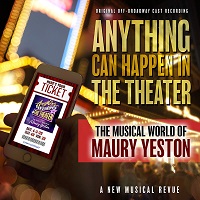 Original Off-Broadway Cast, 2019 (PS Classics)
Original Off-Broadway Cast, 2019 (PS Classics)  (4 / 5) Maury Yeston is one of the finest and most versatile musical theater composer-lyricists of his era, so it’s good to have this cast album of a very enjoyable and well-crafted revue of his work that was presented Off-Broadway by the York Theatre Company in 2019, directed by Gerard Alessandrini of Forbidden Broadway fame. The program includes songs from Yeston’s most famous shows, with one major exception (see below), along with a healthy sampling of less-well-known material. From Nine, we have the bravura number “Guido’s Song” and the lyrical “Only With You,” both rendered with lovely tenor tone by Benjamin Eakeley, as well as the gorgeous “Unusual Way” and the wittily seductive “A Call From the Vatican,” two fine showcases for the talents of Mamie Parris. Also to be found here is “Cinema Italiano,” written by Yeston expressly for the film version of Nine, performed with verve by Parris, Justin Keyes, and Jovan E’Sean. Two selections from Grand Hotel, for which Yeston contributed much but not all of the score (to augment songs previously written by Wright and Forrest for an earlier incarnation of the show), are the passionate “Love Can’t Happen” (Eakeley) and the delightful “I Want to Go to Hollywood” (Parris). Yeston’s Phantom, a lesser-known alternative to Andrew Lloyd Webber’s adaptation of the same source material, is represented by “Home,” sung by the full company. “New Words,” from a Biblical musical titled In the Beginning , is a touching song, movingly performed here by Eakeley, about a parent teaching language to a young child; the writing is marred only by a surprising error in the lyrics. (Mars is a planet, Mr Y., not a star!) This recording also embraces several stand-alone songs, i.e., not from the scores of musicals. Two of the best of these are “Danglin’,” a soulful torcher eased on down by Alex Getlin, and the specially written title tune of the revue, delivered by all as the opening number. An exceptionally noteworthy item is the sexy/funny “Salt n Pepper,” originally written for the unproduced musical The Queen of Basin Street, here given a spicy turn by E’Sean. Not sampled is the score of one of Yeston’s biggest hits, Titanic; although an exquisitely harmonized arrangement of that title song was featured as an encore in the York production, it’s not on the album, for some reason. Conversely, one thing the recording boasts that the show itself did not are Doug Besterman’s excellent orchestrations for eight musicians variously playing a total of about 20 instruments. Greg Jarrett is the top-notch musical director — Michael Portantiere
(4 / 5) Maury Yeston is one of the finest and most versatile musical theater composer-lyricists of his era, so it’s good to have this cast album of a very enjoyable and well-crafted revue of his work that was presented Off-Broadway by the York Theatre Company in 2019, directed by Gerard Alessandrini of Forbidden Broadway fame. The program includes songs from Yeston’s most famous shows, with one major exception (see below), along with a healthy sampling of less-well-known material. From Nine, we have the bravura number “Guido’s Song” and the lyrical “Only With You,” both rendered with lovely tenor tone by Benjamin Eakeley, as well as the gorgeous “Unusual Way” and the wittily seductive “A Call From the Vatican,” two fine showcases for the talents of Mamie Parris. Also to be found here is “Cinema Italiano,” written by Yeston expressly for the film version of Nine, performed with verve by Parris, Justin Keyes, and Jovan E’Sean. Two selections from Grand Hotel, for which Yeston contributed much but not all of the score (to augment songs previously written by Wright and Forrest for an earlier incarnation of the show), are the passionate “Love Can’t Happen” (Eakeley) and the delightful “I Want to Go to Hollywood” (Parris). Yeston’s Phantom, a lesser-known alternative to Andrew Lloyd Webber’s adaptation of the same source material, is represented by “Home,” sung by the full company. “New Words,” from a Biblical musical titled In the Beginning , is a touching song, movingly performed here by Eakeley, about a parent teaching language to a young child; the writing is marred only by a surprising error in the lyrics. (Mars is a planet, Mr Y., not a star!) This recording also embraces several stand-alone songs, i.e., not from the scores of musicals. Two of the best of these are “Danglin’,” a soulful torcher eased on down by Alex Getlin, and the specially written title tune of the revue, delivered by all as the opening number. An exceptionally noteworthy item is the sexy/funny “Salt n Pepper,” originally written for the unproduced musical The Queen of Basin Street, here given a spicy turn by E’Sean. Not sampled is the score of one of Yeston’s biggest hits, Titanic; although an exquisitely harmonized arrangement of that title song was featured as an encore in the York production, it’s not on the album, for some reason. Conversely, one thing the recording boasts that the show itself did not are Doug Besterman’s excellent orchestrations for eight musicians variously playing a total of about 20 instruments. Greg Jarrett is the top-notch musical director — Michael Portantiere
Frozen
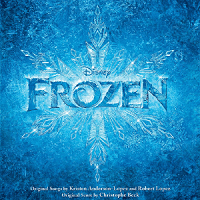 Film Soundtrack, 2013 (Walt Disney Records)
Film Soundtrack, 2013 (Walt Disney Records)  (4 / 5) One of the most popular titles in Disney’s history, Frozen revolves around two royal sisters: Elsa, who has the power to conjure snow and ice but is unable to control it, and Anna, who possesses no magical powers but is adventurous and desirous to be in love. By the end, they realize that the love they have for each other is strong enough to help Elsa control her powers, and is just as meaningful as any romantic relationship. A massive and enduring success, Frozen has received constant exposure in pop culture and media, leading many to become exhausted by the film, but first time listeners to this soundtrack will likely understand why it has continued to capture audiences. The songs, written by the married team of Kristin Anderson-Lopez and Robert Lopez (with incidental and choral scoring by Christophe Beck), are an intelligent blend of traditional musical theater and modern day pop, making the score feel both classic and current. (Doug Besterman provides lush and creative orchestrations.) The lyrics are often playful and cute while still offering strong character insight. “In Summer,” in particular, has a wittily morbid edge to it as sung by Olaf, a clueless snowman (Josh Gad) who wants nothing more than to experience warm weather, not realizing how it will effect his snow-based body. Frozen also benefits from having the strongest vocal cast for a Disney film since Beauty and the Beast, employing almost exclusively Broadway talent. In addition to Gad, we have Idina Menzel as Elsa, Kristin Bell as Anna, and Santino Fontana bringing credible Prince-ly charm to Hans. Bell gets quite a few songs to showcase her pure, classic-Disney-Princess soprano (she and Fontana work particularly well together on “Love is an Open Door”), but it’s Menzel who does the vocal heavy lifting, as in the soundtrack’s phenomenal breakout hit, “Let It Go.” Though it has been overplayed to the point of its becoming a pop culture punchline, at its core the song is well-structured and catchy, belted out by Menzel with great relish. In the movie and on this soundtrack album, only Jonathan Groff is musically wasted as Kristoff, a romantic foil for Anna, his singing limited to the thankfully short “Reindeers are Better Than People.” Otherwise, Frozen is a delight. — Matt Koplik
(4 / 5) One of the most popular titles in Disney’s history, Frozen revolves around two royal sisters: Elsa, who has the power to conjure snow and ice but is unable to control it, and Anna, who possesses no magical powers but is adventurous and desirous to be in love. By the end, they realize that the love they have for each other is strong enough to help Elsa control her powers, and is just as meaningful as any romantic relationship. A massive and enduring success, Frozen has received constant exposure in pop culture and media, leading many to become exhausted by the film, but first time listeners to this soundtrack will likely understand why it has continued to capture audiences. The songs, written by the married team of Kristin Anderson-Lopez and Robert Lopez (with incidental and choral scoring by Christophe Beck), are an intelligent blend of traditional musical theater and modern day pop, making the score feel both classic and current. (Doug Besterman provides lush and creative orchestrations.) The lyrics are often playful and cute while still offering strong character insight. “In Summer,” in particular, has a wittily morbid edge to it as sung by Olaf, a clueless snowman (Josh Gad) who wants nothing more than to experience warm weather, not realizing how it will effect his snow-based body. Frozen also benefits from having the strongest vocal cast for a Disney film since Beauty and the Beast, employing almost exclusively Broadway talent. In addition to Gad, we have Idina Menzel as Elsa, Kristin Bell as Anna, and Santino Fontana bringing credible Prince-ly charm to Hans. Bell gets quite a few songs to showcase her pure, classic-Disney-Princess soprano (she and Fontana work particularly well together on “Love is an Open Door”), but it’s Menzel who does the vocal heavy lifting, as in the soundtrack’s phenomenal breakout hit, “Let It Go.” Though it has been overplayed to the point of its becoming a pop culture punchline, at its core the song is well-structured and catchy, belted out by Menzel with great relish. In the movie and on this soundtrack album, only Jonathan Groff is musically wasted as Kristoff, a romantic foil for Anna, his singing limited to the thankfully short “Reindeers are Better Than People.” Otherwise, Frozen is a delight. — Matt Koplik
 Original Broadway Cast, 2018 (Walt Disney Records)
Original Broadway Cast, 2018 (Walt Disney Records)  (3 / 5) In the continuing line of movies translated to the stage, Disney has had an erratic track record, ranging from great success (The Lion King) to major disappointments (The Little Mermaid, Tarzan). The Broadway adaptation of Frozen, which this recording represents, lies somewhere in the middle. On the plus side, the show tries to dig deeper into its source material than most other Disney stage musicals, but the results are often middling. Kristin Anderson-Lopez and Robert Lopez have been brought back to expand their score from the film, and Dave Metzger’s orchestrations pretty much follow Doug Besterman’s blueprints. But while new songs like “Dangerous to Dream,” “Hans of the Southern Isles,” and “True Love” are commendable in their intentions to give the characters complexity, they really can’t be described as anything more than serviceably listenable. Of all the additions, the song that comes closest to standing out is “Monster,” a second-act number for Elsa — but, musically, even that feels more like a lesser “Let it Go” than a fully developed new piece. While the principal players may not be able to separate themselves completely from the original movie cast, they are all strong singers and inject plenty of personality into their performances. As the two sisters, Caissie Levy (Elsa) and Patti Murin (Anna) work particularly hard not to present cartoonish interpretations while skillfully navigating the demands of the score. The recording is also well worth a listen for Stephen Oremus’s stunning vocal arrangements, which give the pre-existing songs from the film a shot of Broadway adrenaline and provide the show’s ensemble with rich choral material (“Vuelie” and “Queen Anointed” are particularly haunting). If this recording isn’t good enough to replace Frozen’s original soundtrack, it’s worthy to stand alongside it — or a few steps behind, at least. — M.K.
(3 / 5) In the continuing line of movies translated to the stage, Disney has had an erratic track record, ranging from great success (The Lion King) to major disappointments (The Little Mermaid, Tarzan). The Broadway adaptation of Frozen, which this recording represents, lies somewhere in the middle. On the plus side, the show tries to dig deeper into its source material than most other Disney stage musicals, but the results are often middling. Kristin Anderson-Lopez and Robert Lopez have been brought back to expand their score from the film, and Dave Metzger’s orchestrations pretty much follow Doug Besterman’s blueprints. But while new songs like “Dangerous to Dream,” “Hans of the Southern Isles,” and “True Love” are commendable in their intentions to give the characters complexity, they really can’t be described as anything more than serviceably listenable. Of all the additions, the song that comes closest to standing out is “Monster,” a second-act number for Elsa — but, musically, even that feels more like a lesser “Let it Go” than a fully developed new piece. While the principal players may not be able to separate themselves completely from the original movie cast, they are all strong singers and inject plenty of personality into their performances. As the two sisters, Caissie Levy (Elsa) and Patti Murin (Anna) work particularly hard not to present cartoonish interpretations while skillfully navigating the demands of the score. The recording is also well worth a listen for Stephen Oremus’s stunning vocal arrangements, which give the pre-existing songs from the film a shot of Broadway adrenaline and provide the show’s ensemble with rich choral material (“Vuelie” and “Queen Anointed” are particularly haunting). If this recording isn’t good enough to replace Frozen’s original soundtrack, it’s worthy to stand alongside it — or a few steps behind, at least. — M.K.
Aladdin (Alan Menken et al.)
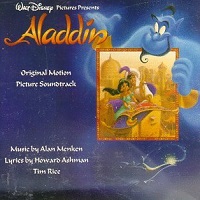 Film Soundtrack, 1992 (Walt Disney Records)
Film Soundtrack, 1992 (Walt Disney Records)  (3 / 5) Following the immense success of The Little Mermaid and Beauty and the Beast, Disney Animation firmly solidified what is now known as “The Disney Renaissance” with the critical and financial success of Aladdin in 1992. All three films featured scores with music by Alan Menken and lyrics by Howard Ashman, previously best known for their work on Little Shop of Horrors. Ashman envisioned Aladdin, the story of a teenage hoodlum who happens upon a magic lamp containing a genie, as a madcap romp set in the Middle East. But Ashman succumbed to complications from AIDS before he could finish work on the project, and some of the songs he co-wrote were ultimately not used. In fact, only three songs with lyrics by Ashman remain in the film — “Arabian Nights,” “Friend Like Me,” and “Prince Ali” — with Tim Rice providing lyrics for two additions, “One Jump Ahead” and “A Whole New World.” If Rice’s lyrics don’t have the same level of wit and character as Ashman’s, they’re still fun and don’t feel like a jarring departure. This is a very enjoyable recording, and it boasts what remains the best vocal leads of any Aladdin recording. Brad Kane is a charismatic Aladdin, blending well with Lea Salonga’s Princess Jasmine on the Oscar-winning “A Whole New World,” and Robin Williams is definitive as the genie of the lamp. Note: The deluxe edition of this soundtrack album includes bonus tracks of Howard Ashman singing demos for two songs cut from the film, the moving “Proud of Your Boy” and the fun “High Adventure.” — Matt Koplik
(3 / 5) Following the immense success of The Little Mermaid and Beauty and the Beast, Disney Animation firmly solidified what is now known as “The Disney Renaissance” with the critical and financial success of Aladdin in 1992. All three films featured scores with music by Alan Menken and lyrics by Howard Ashman, previously best known for their work on Little Shop of Horrors. Ashman envisioned Aladdin, the story of a teenage hoodlum who happens upon a magic lamp containing a genie, as a madcap romp set in the Middle East. But Ashman succumbed to complications from AIDS before he could finish work on the project, and some of the songs he co-wrote were ultimately not used. In fact, only three songs with lyrics by Ashman remain in the film — “Arabian Nights,” “Friend Like Me,” and “Prince Ali” — with Tim Rice providing lyrics for two additions, “One Jump Ahead” and “A Whole New World.” If Rice’s lyrics don’t have the same level of wit and character as Ashman’s, they’re still fun and don’t feel like a jarring departure. This is a very enjoyable recording, and it boasts what remains the best vocal leads of any Aladdin recording. Brad Kane is a charismatic Aladdin, blending well with Lea Salonga’s Princess Jasmine on the Oscar-winning “A Whole New World,” and Robin Williams is definitive as the genie of the lamp. Note: The deluxe edition of this soundtrack album includes bonus tracks of Howard Ashman singing demos for two songs cut from the film, the moving “Proud of Your Boy” and the fun “High Adventure.” — Matt Koplik
 Original Broadway Cast, 2014 (Walt Disney Records)
Original Broadway Cast, 2014 (Walt Disney Records)  (3 / 5) The success of Aladdin as an animated film led to a stage adaptation two decades later. The good news is that the results were far more successful than many other Disney transfers, though with some caveats. Choosing to underline Ashman’s original concept of presenting the story as a zany romp, the Broadway Aladdin is shinier, zippier, and sillier than the film. But while the show benefits from the inclusion of three songs with lyrics by Ashman that did not make it into the movie (“Proud of Your Boy,” “High Adventure,” and “Babkak, Omar, Aladdin, Hassim”), Chad Beguelin’s libretto isn’t quite clever enough to hold it all together. Although this is less of a problem on the cast recording than it was on a stage, enough of Beguelin’s meta-commentary jokes are peppered throughout the album (“Everyone here has a minor in dance!”) to make you roll your eyes. On the bright side, the score is given loving treatment in Danny Troob’s vibrant orchestrations and Michael Kosarin’s tight vocal arrangements. The one major misstep is turning the Genie’s “Friend Like Me” into a nearly 10-minute-long production number. While it’s performed energetically by James Monroe Iglehart, the song now feels overstuffed and tiresome. Iglehart is given a much better opportunity with “Prince Ali,” which has also been expanded from the film version, but to more satisfying effect. New additions to the score, such as “These Palace Walls” and “A Million Miles Away,” are pleasant enough, with Menken once again proving his gift for ear worms, but Beguelin’s lyrics are not on the same level as his predecessors’. Adam Jacobs gives an earnest performance as Aladdin, which works in ballads like “Proud of Your Boy” and “A Whole New World” but less well in peppier songs like “One Jump Ahead.” Courtney Reed’s Jasmine is mostly serviceable, though her voice is not as comfortable a fit for “A Whole New World” as Lea Salonga’s. And in a fun bit of déjà vu, Jonathan Freeman vamps it up as the evil villain Jafar, the part he voiced in the 1992 film. If this recording doesn’t have the overall charm of the original soundtrack, it’s still enjoyable, and it introduces audiences to some wonderful Ashman/Menken songs that had previously gone unheard. — M.K.
(3 / 5) The success of Aladdin as an animated film led to a stage adaptation two decades later. The good news is that the results were far more successful than many other Disney transfers, though with some caveats. Choosing to underline Ashman’s original concept of presenting the story as a zany romp, the Broadway Aladdin is shinier, zippier, and sillier than the film. But while the show benefits from the inclusion of three songs with lyrics by Ashman that did not make it into the movie (“Proud of Your Boy,” “High Adventure,” and “Babkak, Omar, Aladdin, Hassim”), Chad Beguelin’s libretto isn’t quite clever enough to hold it all together. Although this is less of a problem on the cast recording than it was on a stage, enough of Beguelin’s meta-commentary jokes are peppered throughout the album (“Everyone here has a minor in dance!”) to make you roll your eyes. On the bright side, the score is given loving treatment in Danny Troob’s vibrant orchestrations and Michael Kosarin’s tight vocal arrangements. The one major misstep is turning the Genie’s “Friend Like Me” into a nearly 10-minute-long production number. While it’s performed energetically by James Monroe Iglehart, the song now feels overstuffed and tiresome. Iglehart is given a much better opportunity with “Prince Ali,” which has also been expanded from the film version, but to more satisfying effect. New additions to the score, such as “These Palace Walls” and “A Million Miles Away,” are pleasant enough, with Menken once again proving his gift for ear worms, but Beguelin’s lyrics are not on the same level as his predecessors’. Adam Jacobs gives an earnest performance as Aladdin, which works in ballads like “Proud of Your Boy” and “A Whole New World” but less well in peppier songs like “One Jump Ahead.” Courtney Reed’s Jasmine is mostly serviceable, though her voice is not as comfortable a fit for “A Whole New World” as Lea Salonga’s. And in a fun bit of déjà vu, Jonathan Freeman vamps it up as the evil villain Jafar, the part he voiced in the 1992 film. If this recording doesn’t have the overall charm of the original soundtrack, it’s still enjoyable, and it introduces audiences to some wonderful Ashman/Menken songs that had previously gone unheard. — M.K.
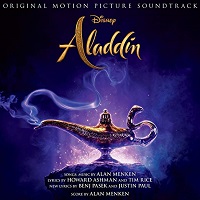 Film Soundtrack, 2019 (Walt Disney Records)
Film Soundtrack, 2019 (Walt Disney Records)  (1 / 5) This is the soundtrack recording of Disney’s recent live action remake of Aladdin, a trend the company has continued ever since the massive financial success it had with its remake of Beauty and the Beast. The Aladdin soundtrack is not nearly the disaster that Beast was: the arrangements are mostly similar to the originals (though some pop and hip hop influenced percussion has been added), and the cast is of a higher vocal caliber (if still auto-tuned). Yet, the recording is mostly free of personality; everything is clear and pleasant enough, but it’s missing energy and character. Nowhere is this more evident than in Will Smith’s performance as the Genie. Whereas both Robin Williams and James Monroe Iglehart gave everything they had to the role, Smith goes for a more laid back, casual approach to the magical sidekick. This is a mistake, and though he doesn’t completely bungle his two big songs, “Friend Like Me” and “Prince Ali,” they barely register here. Mena Massoud and Naomi Scott are both fine as, respectively, Aladdin and Princess Jasmine, but they certainly don’t wipe away memories of their predecessors in these roles. Scott has been given a new number written by Menken with lyrics by Benj Pasek and Justin Paul, “Speechless,” but the lyrics are so nondescript and the melody so jarringly different from the rest of the score that it doesn’t do anything to distinguish Scott’s Jasmine from Salonga’s or Reed’s. So, while this isn’t the worst soundtrack of a Disney remake, it’s the blandest of all three Aladdin recordings and is really more for completists than for anyone who want to be exposed to the score for the first time. — M.K.
(1 / 5) This is the soundtrack recording of Disney’s recent live action remake of Aladdin, a trend the company has continued ever since the massive financial success it had with its remake of Beauty and the Beast. The Aladdin soundtrack is not nearly the disaster that Beast was: the arrangements are mostly similar to the originals (though some pop and hip hop influenced percussion has been added), and the cast is of a higher vocal caliber (if still auto-tuned). Yet, the recording is mostly free of personality; everything is clear and pleasant enough, but it’s missing energy and character. Nowhere is this more evident than in Will Smith’s performance as the Genie. Whereas both Robin Williams and James Monroe Iglehart gave everything they had to the role, Smith goes for a more laid back, casual approach to the magical sidekick. This is a mistake, and though he doesn’t completely bungle his two big songs, “Friend Like Me” and “Prince Ali,” they barely register here. Mena Massoud and Naomi Scott are both fine as, respectively, Aladdin and Princess Jasmine, but they certainly don’t wipe away memories of their predecessors in these roles. Scott has been given a new number written by Menken with lyrics by Benj Pasek and Justin Paul, “Speechless,” but the lyrics are so nondescript and the melody so jarringly different from the rest of the score that it doesn’t do anything to distinguish Scott’s Jasmine from Salonga’s or Reed’s. So, while this isn’t the worst soundtrack of a Disney remake, it’s the blandest of all three Aladdin recordings and is really more for completists than for anyone who want to be exposed to the score for the first time. — M.K.
Inner City
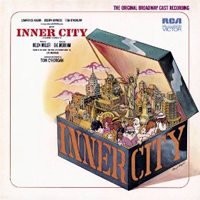 Original Broadway Cast, 1971 (RCA/Masterworks Broadway)
Original Broadway Cast, 1971 (RCA/Masterworks Broadway)  (4 / 5) Perhaps the source material was too obscure for audiences to really understand this show, which only ran on Broadway for 97 performances (and 24 previews). What poet Eve Merriam originally wrote was Inner City Mother Goose, a new take on nursery rhymes from an urban, sometimes violent perspective. So the familiar “Fee Fi Fo Fum” was followed by the less-expected “I smell the blood of violence to come,” while “Now I lay me down to sleep” was followed by “and I pray the double lock will keep.” Helen Miller set the poems to theatrical rock music. Most of them last a minute or less, but they’re memorable minutes. In “Hushabye Baby,” an unwed teenager sings about the child she’ll soon have, and it sounds like something that Brecht and Weill might have written had they been around in the early 1970s. Other highlights include “On This Rock,” a statement of urban pride; the jaunty “City Life”; and the pulsating “Law and Order,” which the TV series of the same title should have used as its theme song. “Deep in the Night” and “It’s My Belief” are solid anthems that helped win Linda Hopkins a Tony Award as Best Featured Actress. Then there’s “The Hooker,” in which a prostitute sings, “If they want to hear a story, then I give out with a story…I need ten dollars for grandma, who is coughing and spitting up blood. But whaddaya say we cut the crap?” The same socko melody is used for both “The Pusher” and “The Pickpocket,” but that last one didn’t make the album. That’s all right, we should be very grateful that this short-running show yielded a cast recording at all. — Peter Filichia
(4 / 5) Perhaps the source material was too obscure for audiences to really understand this show, which only ran on Broadway for 97 performances (and 24 previews). What poet Eve Merriam originally wrote was Inner City Mother Goose, a new take on nursery rhymes from an urban, sometimes violent perspective. So the familiar “Fee Fi Fo Fum” was followed by the less-expected “I smell the blood of violence to come,” while “Now I lay me down to sleep” was followed by “and I pray the double lock will keep.” Helen Miller set the poems to theatrical rock music. Most of them last a minute or less, but they’re memorable minutes. In “Hushabye Baby,” an unwed teenager sings about the child she’ll soon have, and it sounds like something that Brecht and Weill might have written had they been around in the early 1970s. Other highlights include “On This Rock,” a statement of urban pride; the jaunty “City Life”; and the pulsating “Law and Order,” which the TV series of the same title should have used as its theme song. “Deep in the Night” and “It’s My Belief” are solid anthems that helped win Linda Hopkins a Tony Award as Best Featured Actress. Then there’s “The Hooker,” in which a prostitute sings, “If they want to hear a story, then I give out with a story…I need ten dollars for grandma, who is coughing and spitting up blood. But whaddaya say we cut the crap?” The same socko melody is used for both “The Pusher” and “The Pickpocket,” but that last one didn’t make the album. That’s all right, we should be very grateful that this short-running show yielded a cast recording at all. — Peter Filichia
Hadestown
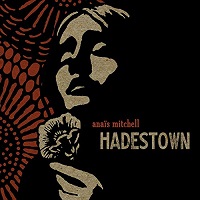 Studio Cast, 2010 (Wilderland Records)
Studio Cast, 2010 (Wilderland Records)  (3 / 5) Though indie singer/songwriter Anaïs Mitchell always meant for Hadestown to be a stage musical, its first incarnation was in the form of this concept album, recorded for posterity and to give the piece greater audience outreach. The response was overwhelmingly strong, and Hadestown grew a dedicated fan base over the years until a production opened at the New York Theatre Workshop in 2016, followed by the show’s Broadway premiere in 2019. Considering the immediately intense response from fans, it’s surprising now to hear how simplistic the concept album is; compared to other concept albums that became stage musicals (Evita, for example), this one is a much more relaxed affair. Based on the Greek myth of Orpheus, who travels to the Underworld (“Hadestown”) to bring back his love Eurydice, the piece as heard on this recording is a fairly straightforward retelling of the myth and is mostly a platform for Mitchell’s talents as a songwriter. Her music can groove festively (“Way Down in Hadestown,” “When the Chips Are Down”) or float dreamlike (“Wedding Song,” “Wait For Me”), always with an edgy undercurrent that foreshadows the danger lying ahead. Mitchell’s lyrics are poetically expressive, though they become sharper and more story-driven on the later cast albums. Here, Mitchell herself sings the role of Eurydice while Justin Vernon performs Orpheus. An odd choice is made in the mixing of Vernon’s vocals so that it sounds like multiple Vernons are singing together each time Orpheus is present. (According to the myth, Orpheus possessed a mystically beautiful singing voice, and the mixing may have been meant to reflect that, but the effect is off-putting.) Those who were unfamiliar with Hadestown until it came to Broadway and who desire to hear its origins will find this album mostly engaging, but both subsequent recordings of the score are superior and, of course, more indicative of what the piece eventually became. — Matt Koplik
(3 / 5) Though indie singer/songwriter Anaïs Mitchell always meant for Hadestown to be a stage musical, its first incarnation was in the form of this concept album, recorded for posterity and to give the piece greater audience outreach. The response was overwhelmingly strong, and Hadestown grew a dedicated fan base over the years until a production opened at the New York Theatre Workshop in 2016, followed by the show’s Broadway premiere in 2019. Considering the immediately intense response from fans, it’s surprising now to hear how simplistic the concept album is; compared to other concept albums that became stage musicals (Evita, for example), this one is a much more relaxed affair. Based on the Greek myth of Orpheus, who travels to the Underworld (“Hadestown”) to bring back his love Eurydice, the piece as heard on this recording is a fairly straightforward retelling of the myth and is mostly a platform for Mitchell’s talents as a songwriter. Her music can groove festively (“Way Down in Hadestown,” “When the Chips Are Down”) or float dreamlike (“Wedding Song,” “Wait For Me”), always with an edgy undercurrent that foreshadows the danger lying ahead. Mitchell’s lyrics are poetically expressive, though they become sharper and more story-driven on the later cast albums. Here, Mitchell herself sings the role of Eurydice while Justin Vernon performs Orpheus. An odd choice is made in the mixing of Vernon’s vocals so that it sounds like multiple Vernons are singing together each time Orpheus is present. (According to the myth, Orpheus possessed a mystically beautiful singing voice, and the mixing may have been meant to reflect that, but the effect is off-putting.) Those who were unfamiliar with Hadestown until it came to Broadway and who desire to hear its origins will find this album mostly engaging, but both subsequent recordings of the score are superior and, of course, more indicative of what the piece eventually became. — Matt Koplik
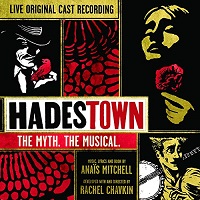 Original Off-Broadway Cast, 2017 (Warner Classics)
Original Off-Broadway Cast, 2017 (Warner Classics)  (4 / 5) Recorded live at the New York Theatre Workshop, this album has high-energy performances and a number of welcome changes to the piece since its original incarnation. The biggest change is that the Hadestown heard here is no longer so straightforward a re-telling of the Orpheus and Eurydice myth, but builds upon it by expanding characters that didn’t have much presence on the original recording and giving them more active roles. These include the messenger god Hermes (Chris Sullivan), who now narrates the proceedings. A trio of actresses called The Fates are more fully present as a Greek Chorus, and the myth of Hades (a quietly domineering Patrick Page) and his wife, Persephone (Amber Grey), is explored with greater depth here, showing us how their marriage, once passionate but now cold, has detrimentally effected the characters on earth. These changes make Hadestown a more fulfilling and well rounded piece, but they also create a new problem: Mitchell has written the supporting characters with a hard edge and a playful attitude, whereas her songs for Orpheus and Eurydice have a more earnest romanticism. On a surface level, this makes sense, as the young pair are meant to provide the heart of the piece. But in giving the supporting characters such rich, lively material, Mitchell has made them more interesting than the two leads. It doesn’t help that several of Orpheus and Eurydice’s songs included in the NYTW production are inexplicably not on the album. (“Wedding Song” is a major loss). Considering all of this, Damon Daunno and Nabiyah Be do admirable work as the doomed lovers. In fact, Daunno, is perhaps the best Orpheus heard on any of the official Hadestown recordings; he gives the character a confident, passionate swagger, and his voice sails smoothly through Mitchell’s score, seamlessly gliding in and out of a pure falsetto. Generally speaking, what’s presented on this recording is so well done that it almost makes up for the material that isn’t included. Fan favorites from the concept album, such as Orpheus’ “Wait for Me” or Hades’ scarily relevant “Why We Build the Wall,” are still here, but Mitchell’s additions are also worth noting: Persephone is given the jaunty “Livin it Up On Top,” gracefully vamped by Grey, and Hermes begins the show with a new opening number, “Road to Hell.” From the moment a trombone wails a jazzy, New Orleans-fueled intro to that song (orchestraters Michael Chorney and Todd Sickafoose continue from the concept album), you know that the energy of Hadestown has shifted from relaxed mysticism to hot theatricality. It’s a welcome change. — M.K.
(4 / 5) Recorded live at the New York Theatre Workshop, this album has high-energy performances and a number of welcome changes to the piece since its original incarnation. The biggest change is that the Hadestown heard here is no longer so straightforward a re-telling of the Orpheus and Eurydice myth, but builds upon it by expanding characters that didn’t have much presence on the original recording and giving them more active roles. These include the messenger god Hermes (Chris Sullivan), who now narrates the proceedings. A trio of actresses called The Fates are more fully present as a Greek Chorus, and the myth of Hades (a quietly domineering Patrick Page) and his wife, Persephone (Amber Grey), is explored with greater depth here, showing us how their marriage, once passionate but now cold, has detrimentally effected the characters on earth. These changes make Hadestown a more fulfilling and well rounded piece, but they also create a new problem: Mitchell has written the supporting characters with a hard edge and a playful attitude, whereas her songs for Orpheus and Eurydice have a more earnest romanticism. On a surface level, this makes sense, as the young pair are meant to provide the heart of the piece. But in giving the supporting characters such rich, lively material, Mitchell has made them more interesting than the two leads. It doesn’t help that several of Orpheus and Eurydice’s songs included in the NYTW production are inexplicably not on the album. (“Wedding Song” is a major loss). Considering all of this, Damon Daunno and Nabiyah Be do admirable work as the doomed lovers. In fact, Daunno, is perhaps the best Orpheus heard on any of the official Hadestown recordings; he gives the character a confident, passionate swagger, and his voice sails smoothly through Mitchell’s score, seamlessly gliding in and out of a pure falsetto. Generally speaking, what’s presented on this recording is so well done that it almost makes up for the material that isn’t included. Fan favorites from the concept album, such as Orpheus’ “Wait for Me” or Hades’ scarily relevant “Why We Build the Wall,” are still here, but Mitchell’s additions are also worth noting: Persephone is given the jaunty “Livin it Up On Top,” gracefully vamped by Grey, and Hermes begins the show with a new opening number, “Road to Hell.” From the moment a trombone wails a jazzy, New Orleans-fueled intro to that song (orchestraters Michael Chorney and Todd Sickafoose continue from the concept album), you know that the energy of Hadestown has shifted from relaxed mysticism to hot theatricality. It’s a welcome change. — M.K.
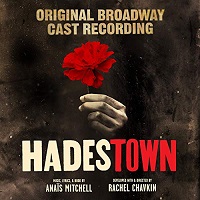 Original Broadway Cast, 2019 (Sing It Again Records)
Original Broadway Cast, 2019 (Sing It Again Records)  (5 / 5) After the workshop production at NYTW, Hadestown was staged in Canada and at the Royal National Theatre in London, where it continued to develop until it finally came to Broadway nearly a decade after the release of the concept album. On stage, the result is often breathtaking, with Mitchell’s score embracing its theatrical potential and director Rachel Chavkin and her team of designers working visual wonders. Some have complained that, in turning Hadestown into a full evening of theater, Mitchell overstuffed the piece with unnecessary material. There’s some truth there, in that, when the show is experienced live on stage, some numbers feel less important than others and/or seem to reiterate points made previously. But when listening to the recording, all of those complaints melt away, and we’re left with Mitchell’s fantastic work sung by a phenomenal company. Grey and Page are back as Persephone and Hades, with André de Shields offering a wiser and kinder Hermes than his predecessors. Eva Noblezada is a passionately sung Eurydice; her performance, and the addition of “Any Way the Wind Blows” (an already established song of Mitchell’s), give the character some much needed grit. Reeve Carney’s interpretation of Orpheus aims more towards a wandering man-child than the swaggering heartthrob offered by Daunno. This is fine, although it robs the character’s romantic pairing with Eurydice of heat. Also, while Carney has a strong voice and does well by the material, his singing is not quite as smooth and effortless as Daunno’s. Still, these are small quibbles about what’s overall a terrific album. One of its major highlights is “Wait for Me,” Orpheus’ cry to Eurydice as he travels to the Underworld to save her. While the song was moving and pretty on the concept album, Mitchell, Chorney and Sickafoose here have shaped it into something spectacularly theatrical. And, speaking of waiting: Fans of Hadestown had to wait almost 10 years for the piece to become a completely satisfying stage musical, but their patience has been well rewarded. — M.K.
(5 / 5) After the workshop production at NYTW, Hadestown was staged in Canada and at the Royal National Theatre in London, where it continued to develop until it finally came to Broadway nearly a decade after the release of the concept album. On stage, the result is often breathtaking, with Mitchell’s score embracing its theatrical potential and director Rachel Chavkin and her team of designers working visual wonders. Some have complained that, in turning Hadestown into a full evening of theater, Mitchell overstuffed the piece with unnecessary material. There’s some truth there, in that, when the show is experienced live on stage, some numbers feel less important than others and/or seem to reiterate points made previously. But when listening to the recording, all of those complaints melt away, and we’re left with Mitchell’s fantastic work sung by a phenomenal company. Grey and Page are back as Persephone and Hades, with André de Shields offering a wiser and kinder Hermes than his predecessors. Eva Noblezada is a passionately sung Eurydice; her performance, and the addition of “Any Way the Wind Blows” (an already established song of Mitchell’s), give the character some much needed grit. Reeve Carney’s interpretation of Orpheus aims more towards a wandering man-child than the swaggering heartthrob offered by Daunno. This is fine, although it robs the character’s romantic pairing with Eurydice of heat. Also, while Carney has a strong voice and does well by the material, his singing is not quite as smooth and effortless as Daunno’s. Still, these are small quibbles about what’s overall a terrific album. One of its major highlights is “Wait for Me,” Orpheus’ cry to Eurydice as he travels to the Underworld to save her. While the song was moving and pretty on the concept album, Mitchell, Chorney and Sickafoose here have shaped it into something spectacularly theatrical. And, speaking of waiting: Fans of Hadestown had to wait almost 10 years for the piece to become a completely satisfying stage musical, but their patience has been well rewarded. — M.K.
Ain’t Too Proud: The Life and Times of the Temptations
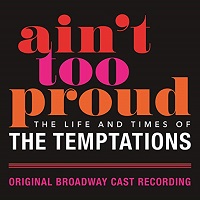 Original Broadway Cast, 2019 (Universal Music)
Original Broadway Cast, 2019 (Universal Music)  (5 / 5) There’s always a sense of déjà vu when a jukebox musical opens on Broadway, as most people walk in humming the tunes. If Ain’t Too Proud: The Life and Times of the Temptations doubles that feeling, it might be due to another “ain’t” from distant memory: Ain’t Misbehavin’, the first jukebox revue to take home the Tony Award for Best Musical. Ain’t Too Proud offers audiences just what that 1978 show did, with great songs delivered in great performances. Praised for its spirited direction (Des McAnuff), clever book (Dominique Morisseau), and high-voltage choreography by Sergio Trujillo, who took home a Tony for his work, Ain’t Too Proud also delivers the goods in its cast recording. The energy of what’s being performed eight times a week at the Imperial Theatre is all here in an album made up of more than two dozen Temptations songs, featuring the one-of-a-kind Detroit rock & roll rhythms and harmonies for which the group became famous. Highlights include such favorites as “My Girl,” “Just My Imagination,” “Get Ready,” and “Papa Was a Rolling Stone.” As the show’s storytelling reveals, there were more than a few “Temps” over the course of the group’s long career besides its original foursome. But Derrick Baskin, James Harkness, Jawan M. Jackson, Jeremy Pope, and Ephraim Sykes stand front and center, leading a tremendously talented cast. The recording also offers a good deal of interstitial narrative, directly from the show’s book, that aids in the appreciation of the story. (Of course, if you so choose, you can eliminate those tracks and custom design the album for your own listening pleasure). Mention should also be made of the fine orchestrations by Harold Wheeler, who at age 75 had his legendary, 50-year Broadway career capped with a special 2019 Tony Award for his contribution to the American musical. — Ron Fassler
(5 / 5) There’s always a sense of déjà vu when a jukebox musical opens on Broadway, as most people walk in humming the tunes. If Ain’t Too Proud: The Life and Times of the Temptations doubles that feeling, it might be due to another “ain’t” from distant memory: Ain’t Misbehavin’, the first jukebox revue to take home the Tony Award for Best Musical. Ain’t Too Proud offers audiences just what that 1978 show did, with great songs delivered in great performances. Praised for its spirited direction (Des McAnuff), clever book (Dominique Morisseau), and high-voltage choreography by Sergio Trujillo, who took home a Tony for his work, Ain’t Too Proud also delivers the goods in its cast recording. The energy of what’s being performed eight times a week at the Imperial Theatre is all here in an album made up of more than two dozen Temptations songs, featuring the one-of-a-kind Detroit rock & roll rhythms and harmonies for which the group became famous. Highlights include such favorites as “My Girl,” “Just My Imagination,” “Get Ready,” and “Papa Was a Rolling Stone.” As the show’s storytelling reveals, there were more than a few “Temps” over the course of the group’s long career besides its original foursome. But Derrick Baskin, James Harkness, Jawan M. Jackson, Jeremy Pope, and Ephraim Sykes stand front and center, leading a tremendously talented cast. The recording also offers a good deal of interstitial narrative, directly from the show’s book, that aids in the appreciation of the story. (Of course, if you so choose, you can eliminate those tracks and custom design the album for your own listening pleasure). Mention should also be made of the fine orchestrations by Harold Wheeler, who at age 75 had his legendary, 50-year Broadway career capped with a special 2019 Tony Award for his contribution to the American musical. — Ron Fassler
The Band’s Visit
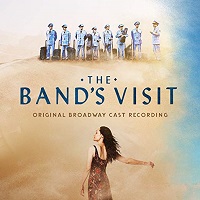 Original Broadway Cast, 2017 (Ghostlight)
Original Broadway Cast, 2017 (Ghostlight)  (5 / 5) Stranded in an Israeli desert town by mistake, an Egyptian band stays overnight with the locals before heading on to their engagement. Composer-lyricist David Yazbek has created a luminous score that highlights not the differences between these strangers, but their commonality, mankind’s shared needs for love and connection. The music incorporates klezmer influences and American jazz, but especially Arabic folk and classical idioms and instruments: the oud, riq, and darbouka. Katrina Lenk’s nuanced voice brings life to the role of cafe owner Dina; she and her friends offer the Egyptians a heaping dish of sarcasm and watermelon in “Welcome to Nowhere.” (Their sleepy village has more “blah, blah, blah” than that Gershwin song.) “It Is What It Is” hints at Dina’s history, but the haunting “Omar Sharif” reveals more, describing how young Dina and her mother adored Sharif movies and the exotic singing of Oum Kaltoum. This admission resonates with Tewfiq, the Egyptian band’s buttoned-up conductor (Tony Shaloub). His single solo is an a cappella number in Arabic, “Itgara’a,” hinting at inner sorrows. Yazbek deftly slides the concluding phrase of “Itgara’a” into Dina’s response, “Something Different.” The other Egyptians also forge bonds with the Israelis, often through music. “The Beat of Your Heart” is an exuberant memory song, evoking how former musician Avrum (Andrew Polk) met his late wife; Camal (George Abud) and Simon (Alok Tewari) joyfully add their violin and clarinet. The awkward Papi (Etai Benson) relates his trouble with girls in the hilarious “Papi Hears the Ocean,” so Haled (Ari’el Stachel) advises him in the style of his idol, Chet Baker (“Haled’s Song About Love””). Camal accompanies Itzik (John Cariani) as he soothes his child in “Itzik’s Lullaby.” The transcendent “Answer Me” concludes the vocals, sung by the “Telephone Guy” (Adam Kantor), who’s forever waiting by the village’s single pay phone in the hope that his girlfriend will call. For a few glorious seconds, the entire company joins in, reflecting the basic human need for connection. Like the Telephone Guy, our ears are “thirsty” for more of that. – Laura Frankos
(5 / 5) Stranded in an Israeli desert town by mistake, an Egyptian band stays overnight with the locals before heading on to their engagement. Composer-lyricist David Yazbek has created a luminous score that highlights not the differences between these strangers, but their commonality, mankind’s shared needs for love and connection. The music incorporates klezmer influences and American jazz, but especially Arabic folk and classical idioms and instruments: the oud, riq, and darbouka. Katrina Lenk’s nuanced voice brings life to the role of cafe owner Dina; she and her friends offer the Egyptians a heaping dish of sarcasm and watermelon in “Welcome to Nowhere.” (Their sleepy village has more “blah, blah, blah” than that Gershwin song.) “It Is What It Is” hints at Dina’s history, but the haunting “Omar Sharif” reveals more, describing how young Dina and her mother adored Sharif movies and the exotic singing of Oum Kaltoum. This admission resonates with Tewfiq, the Egyptian band’s buttoned-up conductor (Tony Shaloub). His single solo is an a cappella number in Arabic, “Itgara’a,” hinting at inner sorrows. Yazbek deftly slides the concluding phrase of “Itgara’a” into Dina’s response, “Something Different.” The other Egyptians also forge bonds with the Israelis, often through music. “The Beat of Your Heart” is an exuberant memory song, evoking how former musician Avrum (Andrew Polk) met his late wife; Camal (George Abud) and Simon (Alok Tewari) joyfully add their violin and clarinet. The awkward Papi (Etai Benson) relates his trouble with girls in the hilarious “Papi Hears the Ocean,” so Haled (Ari’el Stachel) advises him in the style of his idol, Chet Baker (“Haled’s Song About Love””). Camal accompanies Itzik (John Cariani) as he soothes his child in “Itzik’s Lullaby.” The transcendent “Answer Me” concludes the vocals, sung by the “Telephone Guy” (Adam Kantor), who’s forever waiting by the village’s single pay phone in the hope that his girlfriend will call. For a few glorious seconds, the entire company joins in, reflecting the basic human need for connection. Like the Telephone Guy, our ears are “thirsty” for more of that. – Laura Frankos
Desperate Measures
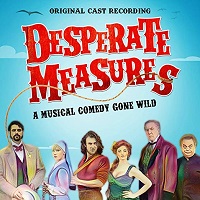 Original Off-Broadway Cast, 2018 (Masterworks Broadway)
Original Off-Broadway Cast, 2018 (Masterworks Broadway)  (3 / 5) People have adapted Shakespeare’s plays into musicals before, usually taking on the Bard’s hits. Librettist/lyricist Peter Kellogg and composer David Friedman chose one of the “problem plays,” Measure for Measure — a complicated stew of morality, corruption, and justice, with not much comedy in it. Kellogg and Friedman dropped their characters in Old West Arizona, and ramped up the sex (keeping the famous “bed trick”) and fun. The result, Desperate Measures, is a raucous, bawdy, old-fashioned musical comedy. The album can’t supply the sight gags, but the performers have great comedic chops, and they land every punch line in Kellogg’s lyrics. Friedman has called his score “Jewish country,” but it’s charmingly varied despite the dominant Western twang. “It Doesn’t Hurt To Try” is a hoedown with banjo and fiddle; “Someday They Will Thank Me” is a comic patter number for the villain, the sleazy governor (Nick Wyman, with a outrageous German accent); and the first act finale, “In the Dark,” is a complex choral piece set to a rhumba rhythm. The scene-setting opener, “The Ballad of Johnny Blood,” is an over-the-top homage to the themes of classic Western TV shows and films like Rawhide and The Good, The Bad, and the Ugly. Broadway influences are present, too, including small nods to Oklahoma! and a big one to Annie Get Your Gun with the best comic challenge duet since “Anything You Can Do”: In “Just For You,” Johnny (Conor Ryan) and saloon girl Bella (the uproarious Lauren Molina) argue over how far each would go in the name of love. (“I slept with another guy, just for you.” “Shot a man and watched him die, just for you.”) Molina also shines in her saloon striptease, “It’s Getting Hot In Here,” and in the duet “The Way That You Feel,” as novice nun Susanna (Emma Degerstedt, with a lovely soprano) instructs her how to be less risqué for the bed trick. Overall, this is a spirited score with heart. — Laura Frankos
(3 / 5) People have adapted Shakespeare’s plays into musicals before, usually taking on the Bard’s hits. Librettist/lyricist Peter Kellogg and composer David Friedman chose one of the “problem plays,” Measure for Measure — a complicated stew of morality, corruption, and justice, with not much comedy in it. Kellogg and Friedman dropped their characters in Old West Arizona, and ramped up the sex (keeping the famous “bed trick”) and fun. The result, Desperate Measures, is a raucous, bawdy, old-fashioned musical comedy. The album can’t supply the sight gags, but the performers have great comedic chops, and they land every punch line in Kellogg’s lyrics. Friedman has called his score “Jewish country,” but it’s charmingly varied despite the dominant Western twang. “It Doesn’t Hurt To Try” is a hoedown with banjo and fiddle; “Someday They Will Thank Me” is a comic patter number for the villain, the sleazy governor (Nick Wyman, with a outrageous German accent); and the first act finale, “In the Dark,” is a complex choral piece set to a rhumba rhythm. The scene-setting opener, “The Ballad of Johnny Blood,” is an over-the-top homage to the themes of classic Western TV shows and films like Rawhide and The Good, The Bad, and the Ugly. Broadway influences are present, too, including small nods to Oklahoma! and a big one to Annie Get Your Gun with the best comic challenge duet since “Anything You Can Do”: In “Just For You,” Johnny (Conor Ryan) and saloon girl Bella (the uproarious Lauren Molina) argue over how far each would go in the name of love. (“I slept with another guy, just for you.” “Shot a man and watched him die, just for you.”) Molina also shines in her saloon striptease, “It’s Getting Hot In Here,” and in the duet “The Way That You Feel,” as novice nun Susanna (Emma Degerstedt, with a lovely soprano) instructs her how to be less risqué for the bed trick. Overall, this is a spirited score with heart. — Laura Frankos
Beetlejuice
 Original Broadway Cast, 2019 (Ghostlight)
Original Broadway Cast, 2019 (Ghostlight)  (4 / 5) How far will a musical go to give you a good time? In the case of Beetlejuice, all the way to the Netherworld and back. Based on Tim Burton’s cult ’80s classic movie of the same title, the show centers around its title character, a fast-talking and wisecracking demon who helps a recently deceased couple try and scare away the family that’s recently moved into their home (though he has his own agenda for doing so). While Burton’s film famously delivered its morbidity with a wry sense of humor that earned it a PG rating, the musical adaptation takes a much zanier, PG-13/R approach. Eddie Perfect’s score has some classic Broadway flourishes sprinkled throughout, but it mostly leans to ’80s-style pop and musical theater faux-rock, which Kris Kukul elevates with his rollicking arrangements and orchestrations. Perfect’s lyrics are also reasonably well crafted, walking the line between wit and crassness. As Beetlejuice, the endlessly energetic Alex Brightman heavily indulges in vocal fry (as a respectful nod to Michael Keaton’s performance in the film) and devours songs like “The Whole ‘Being Dead’ Thing” and “Say My Name” to enjoyable effect. Kerry Butler and Rob McClure are also terrific as the recently deceased couple, Barbara and Adam. They embrace their characters’ intentional blandness in “Ready, Set, Not Yet” without being bland themselves, giving Brightman even more comedic fodder to play with in all of their tracks together. Leslie Kritzer is delightfully wacky as Delia; her “No Reason” duet with Sophia Ann Caruso’s Lydia has some of Perfect’s best lyrics, and is a major highlight of the recording. As the death-obsessed Lydia, Caruso displays a thrillingly unique voice that’s put to good use in her solos “Dead Mom” and “Home.” Enjoyable as the album is, there’s one gripe: Because the score is so eager to entertain, most of the extremely lively songs are packed back to back against each other, and are given no room to breathe. This makes for a rather overwhelming listening experience, with some numbers offering diminishing returns (“Creepy Old Guy” and “That Beautiful Sound” for example). The album may also repel listeners who wanted a more direct replica of the movie, or who prefer their musical comedy without references to cocaine and “ghost zombie Jesus.” But those who are willing to accept Beetlejuice on its own terms are in for a highly entertaining listen. — Matt Koplik
(4 / 5) How far will a musical go to give you a good time? In the case of Beetlejuice, all the way to the Netherworld and back. Based on Tim Burton’s cult ’80s classic movie of the same title, the show centers around its title character, a fast-talking and wisecracking demon who helps a recently deceased couple try and scare away the family that’s recently moved into their home (though he has his own agenda for doing so). While Burton’s film famously delivered its morbidity with a wry sense of humor that earned it a PG rating, the musical adaptation takes a much zanier, PG-13/R approach. Eddie Perfect’s score has some classic Broadway flourishes sprinkled throughout, but it mostly leans to ’80s-style pop and musical theater faux-rock, which Kris Kukul elevates with his rollicking arrangements and orchestrations. Perfect’s lyrics are also reasonably well crafted, walking the line between wit and crassness. As Beetlejuice, the endlessly energetic Alex Brightman heavily indulges in vocal fry (as a respectful nod to Michael Keaton’s performance in the film) and devours songs like “The Whole ‘Being Dead’ Thing” and “Say My Name” to enjoyable effect. Kerry Butler and Rob McClure are also terrific as the recently deceased couple, Barbara and Adam. They embrace their characters’ intentional blandness in “Ready, Set, Not Yet” without being bland themselves, giving Brightman even more comedic fodder to play with in all of their tracks together. Leslie Kritzer is delightfully wacky as Delia; her “No Reason” duet with Sophia Ann Caruso’s Lydia has some of Perfect’s best lyrics, and is a major highlight of the recording. As the death-obsessed Lydia, Caruso displays a thrillingly unique voice that’s put to good use in her solos “Dead Mom” and “Home.” Enjoyable as the album is, there’s one gripe: Because the score is so eager to entertain, most of the extremely lively songs are packed back to back against each other, and are given no room to breathe. This makes for a rather overwhelming listening experience, with some numbers offering diminishing returns (“Creepy Old Guy” and “That Beautiful Sound” for example). The album may also repel listeners who wanted a more direct replica of the movie, or who prefer their musical comedy without references to cocaine and “ghost zombie Jesus.” But those who are willing to accept Beetlejuice on its own terms are in for a highly entertaining listen. — Matt Koplik
In Transit
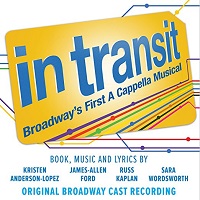 Original Broadway Cast, 2017 (Hollywood Records)
Original Broadway Cast, 2017 (Hollywood Records)  (2 / 5) One wants to applaud In Transit, Broadway’s first a cappella musical, about the semi-connected lives of a small group of New Yorkers played out within and around the subway system. The cast is enthusiastic; the vocal harmonies, arranged by Pitch Perfect’s Deke Sharon, are amazing; Steven “HeaveN” Cantor and Chesney Snow, alternating as beatbox performer Boxman, are percussive wizards; and there are happy endings for the characters. “But, ya know, whatever,” as someone in the show says at one point. The score never really gels, although the writers — Kristen Anderson-Lopez, James-Allen Ford, Russ Kaplan, and Sara Wordsworth — try to convince us that it’s not the destination, it’s the journey that matters most. Journeying “Deep Beneath the City” are Jane (Margo Seibert), slaving in a office while her Broadway dreams fade; her agent, Trent (Justin Guarini), who’s preparing to marry Steven (Telly Leung), although he hasn’t even told his fundamentalist Momma (Moya Angela) that he’s gay; Trent’s friend, Ali (Erin Mackey), newly dumped by her boyfriend; and Ali’s brother, Nate (James Snyder), unemployed and attracted to Jane. (Boxman doesn’t commute. He has found his calling as a subway guru. )Jane’s story arc, while clichéd, comes off best. “Do What I Do” will resonate with anyone stuck in a survival job, and Seibert nails “Getting There,” taking Boxman’s advice to heart. The gay love story is genuine, if bland. Family conflict is set up in the country-flavored “Four Days Home,” and Guarini conveys Trent’s pain when he realizes Momma is deliberately “Choosing Not to Know.” Mackey gets the ultimate 21s-century list song, “Saturday Night Obsession,” cyber-stalking her ex to hilarious comments from the back-ups. In addition to her moments as Momma, Angela unleashes her belt as grumpy subway both clerk Althea and as Jane’s boss. Her sardonic “A Little Friendly Advice” is one of the score’s strongest numbers. But, as a dramatic whole, In Transit would have benefited from more depth of story than a metaphor told in a few vignettes. — Laura Frankos
(2 / 5) One wants to applaud In Transit, Broadway’s first a cappella musical, about the semi-connected lives of a small group of New Yorkers played out within and around the subway system. The cast is enthusiastic; the vocal harmonies, arranged by Pitch Perfect’s Deke Sharon, are amazing; Steven “HeaveN” Cantor and Chesney Snow, alternating as beatbox performer Boxman, are percussive wizards; and there are happy endings for the characters. “But, ya know, whatever,” as someone in the show says at one point. The score never really gels, although the writers — Kristen Anderson-Lopez, James-Allen Ford, Russ Kaplan, and Sara Wordsworth — try to convince us that it’s not the destination, it’s the journey that matters most. Journeying “Deep Beneath the City” are Jane (Margo Seibert), slaving in a office while her Broadway dreams fade; her agent, Trent (Justin Guarini), who’s preparing to marry Steven (Telly Leung), although he hasn’t even told his fundamentalist Momma (Moya Angela) that he’s gay; Trent’s friend, Ali (Erin Mackey), newly dumped by her boyfriend; and Ali’s brother, Nate (James Snyder), unemployed and attracted to Jane. (Boxman doesn’t commute. He has found his calling as a subway guru. )Jane’s story arc, while clichéd, comes off best. “Do What I Do” will resonate with anyone stuck in a survival job, and Seibert nails “Getting There,” taking Boxman’s advice to heart. The gay love story is genuine, if bland. Family conflict is set up in the country-flavored “Four Days Home,” and Guarini conveys Trent’s pain when he realizes Momma is deliberately “Choosing Not to Know.” Mackey gets the ultimate 21s-century list song, “Saturday Night Obsession,” cyber-stalking her ex to hilarious comments from the back-ups. In addition to her moments as Momma, Angela unleashes her belt as grumpy subway both clerk Althea and as Jane’s boss. Her sardonic “A Little Friendly Advice” is one of the score’s strongest numbers. But, as a dramatic whole, In Transit would have benefited from more depth of story than a metaphor told in a few vignettes. — Laura Frankos

